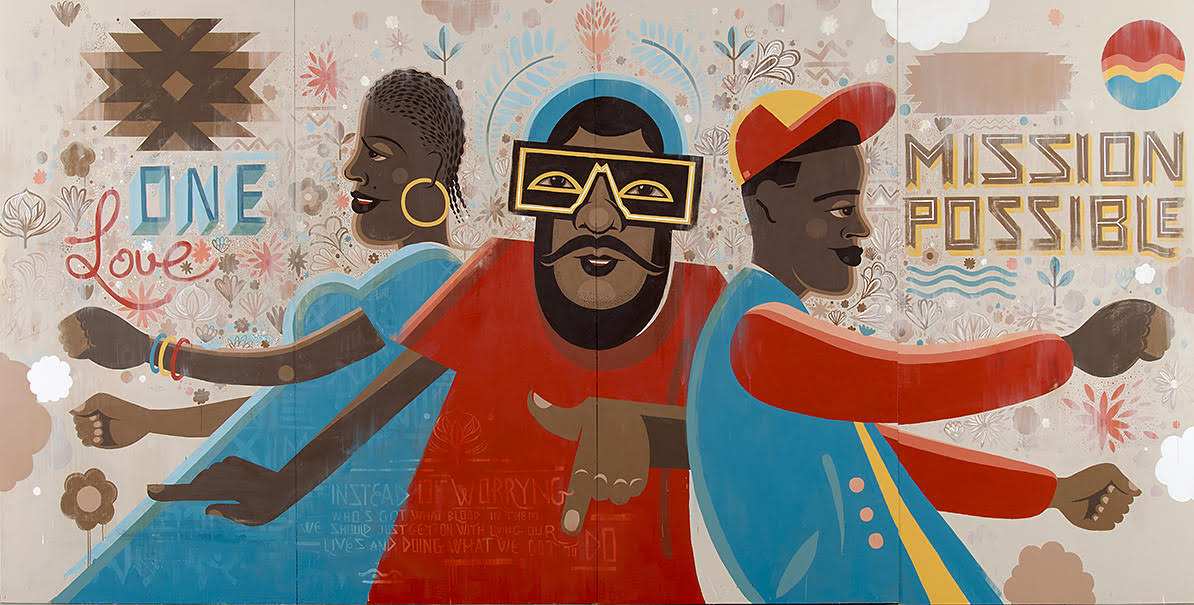
On these pages, you’ll find practical—and hopefully inspirational—advice about the many possible career paths for English majors.
The Why Major in English? tab features a detailed explanation of the value of what you learn in English courses: analysis, writing and oral-communication, digital communication, collaboration, problem-solving, and moral, political, and ethical debate.
The Careers & Internships tab features practical information about landing internships and preparing for the job market—including links to lots of helpful organizations, both on- and off-campus.
The Alumni tab features work-life testimonials written by graduates of the Queens College English Department reflecting on their career paths and how they’ve navigated them. (Click on the image to read a graduate’s full testimonial.) If you’re an alum or know an alum of the English Department who would like to be featured below, please contact Prof. Lee Norton ([email protected]). We love to hear what our graduates are doing!
The English Department at Queens boasts some of the smallest classes at Queens College. As an English major, you will benefit from the sustained attention of your professors. You will receive thoughtful, supportive, and rigorous feedback for your written work and oral presentations—which will be transformative for you as a writer and thinker.
Collaborative learning environment
Many of our classes are discussion-based seminars, where your voice will be heard. You will also be able to get to know your fellow classmates, and be able to participate in extensive class discussions, and shared projects. Many of our students stay in close personal and professional touch with each other—and with us—for decades after graduating. Many great collaborations are born in our English classes and in our extracurricular spaces, like QC Voices, our literary journal, creative readings, and many more.
Accomplished faculty
The English faculty at Queens College is made up of scholars and practitioners with national and international reputations. They are known for contributing to and shaping their disciplines and fields—publishing criticism, journalism, Op-Eds, essays, fiction, poetry, and translation. Queens College faculty contribute to and shape public debates. They will share their knowledge and intellectual discoveries with you, they will provide models for your own scholarly, intellectual, and creative pursuits, and they can invite you into their professional and creative networks.
Your professors will be able to vouch for you as you search for a job or apply for further study; they will know you and your work well.
Often our students tell us: “I was so apprehensive at the beginning when you had us give class presentations. But once I got up the courage to speak, I learned I was really good at it and it got easier the next time I had to speak in public.” Or, without knowing they have a talent for writing poetry, they publish a short lyric poem. Or they discover that they have a flair for research and a knack for argumentation that helps them produce excellent written papers. One reason to major in English is that the writing and presentation abilities you gain will not only help with self-expression, but will be the building blocks of a successful working life–and will be invaluable in all the times in your life where you need to write or speak in public.
Immersion in the digital and multimodal world of writing and publication
Now–more than ever–our culture relies on digital and multimodal communication. Many of our professors are some of the most active thinkers and researchers in online communication. While the digital world has touched our lives deeply, especially during the COVID-19 pandemic, it is in some ways in its infancy, and there is a great deal to learn: about digital selfhood, digital activism, online education and culture and online publication. Queens English is committed to developing your talents as an online “multimodal” writer as well as one who works in print and other analog formats. Equally important, we are committed to developing your ability to self-consciously reflect and understand the contours, potentialities and problems of the online world in which you find yourself, as a critical user of technology.
Exploration of the literary and cultural life of NYC–and beyond
As an English major at Queens College, you will move far beyond Klapper Hall and the Queens campus. Many professors offer activities and study opportunities throughout the city, including dramatic productions, intensive study in galleries and archives, roundtable debates, or open mic readings. Your professors are active participants in the life of the city and beyond, and eager to facilitate these city-wide learning opportunities for you. To be an English major is to get access to the resources of the city and its cultural institutions–and to apply those opportunities to your studies.
Literary study as a gateway to other intellectual passions
The English major is an ideal degree for people with an omnivorous interest in history, philosophy, psychology, social justice activism, music and dance–and many other topics. Since English, American, and Global Literature encompass so many kinds of human experience, it is natural that we use every possible tool to study and appreciate it. As you will see from our alumni profiles, the careers and lives of our students touch every sector of our economy and culture, and the breadth of the English degree prepares you well to adapt to new and changing intellectual currents.
There is a common myth that English majors don’t find good jobs after they complete their degrees. But it really is only a myth. You need only look at what our impressive alumni have done after their studies. It is clear that the English major has opened doors for these alumni, and it can do the same for you. Recent newspaper and magazine stories stress how English majors are in demand in many sectors in the economy.
Here are a few examples:
- “Should I Major in the Humanities?” The Atlantic, 2018
- “English Majors, Rejoice: Employers want you more than business majors,” CBS News, 2018
- “The Myth of the English Major Barista” Inside Higher Ed, 2016
The English Department and Queens College have a thriving alumni community. Look for QC on Linked-In and look for QC English on Instagram and Facebook.
Reflection on how literature, culture, and the written word responds—and shapes—our cultural and political life.
Have you ever noticed that people turn to poems, novels, films and other media forms in times of crisis? One of the aims of the English major is to see the long history of human literary and cultural expression, and the ways in which literary works matter to a culture, and offer meaning, consolation, and communities to their readers and viewers.
To address the most important cultural questions of our time
Our colleagues in English at the University of Nebraska-Lincoln note that importance of “imaginative reasoning,” a value we share at Queens College. They explain this beautifully on their website:
Imaginative reasoning is the ability to use the imagination to think hypothetically about the world in all its diversity—the past, present, and future, the local and the global. Such an ability, we believe, enables all of us to engage critically with social and political phenomena because it allows us to re-envision what is possible and to dream up audacious solutions to seemingly insoluble problems, solutions that might at first seem implausible but, once dreamt up—once imagined—suddenly seem possible. These moments of imaginative insight compel us to ask: Why are such solutions deemed impossible or implausible to begin with? Who says so and for what reasons? What prevents us from dreaming of alternatives, of imagining other paths, in the first place?
At Queens College, we stress the imagination and an expansive engagement not simply to help you engage with the world as it is now, but to try to shape a better political and social reality.
The infographic below will give you a sense of possible careers in publishing, communications, the arts, law, non-profit organizations, technology, education, politics, translation, public relations, advertising, library science, technical writing.
Infographic: Possible Career Paths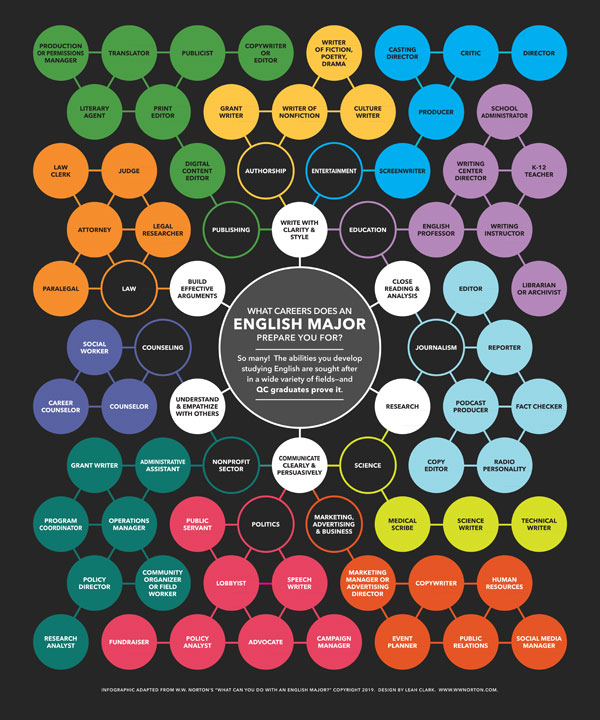
The current job market is evolving quickly. The good news is that employers are looking for young people to invigorate their organizations. Increasingly, employers are offering flexible schedules and a combination of in-person and remote work. Along with grade point average, the single best indicator for success on the job market is the number of internships a student ha completed. That includes both finding a job in your chosen field and salary. Because of this, the English Department and Queens College make it a priority to help students find internship opportunities.
Landing an internship or a job in a field that excites you will require initiative on your part. But we’re here to help, along with Queens College’s Center for Career Engagement and Internships. Contact Professor Lee Norton ([email protected]) for more information.
Scroll down for resources and opportunities for internships and employment.
- Critical acumen
- Close reading and analysis
- Writing with clarity, precision, and style
- Oral Communication
- Collaboration
- Problem solving
Global and intercultural perspectives on urgent questions, including politics, social structures, psychology, aesthetics, and personal relations.
 Career & Self-Development
Career & Self-Development Communication
Communication Critical Thinking
Critical Thinking Equity & Inclusion
Equity & Inclusion Leadership
Leadership Professionalism
Professionalism Teamwork
Teamwork Technology
Technology
For detailed explanations of what’s involved in these competencies, take a look at the NACE Career Readiness site.
Spring 2025 Internship Opportunities for English Majors and Writing Minors ONLY
The English Department is excited to announce a series of internship opportunities available ONLY to Queens College English majors and writing minors.
- Bordighera Press Publishing Internship
- Small Axe Project Publishing Internship
- Lost & Found Publishing Internship
- Women’s Studies Quarterly (WSQ) Internship (not accepting applications)
The deadline to apply for these internships for Spring 2025 is December 13, 2024. (Note that the WSQ position has already been filled). Please click on the links for more information
Other Internship Opportunities and Resources
The Queens College Center for Career Engagement and Internships keeps an updated list of job and internship opportunities—on their Hire QC page—in addition to hosting regular workshops and career fairs. They also provide help preparing resumés, cover letters, and other materials. They can help students apply for scholarships for unpaid internships. They are currently offering remote advisement for students. They also offer competitive stipends for students doing unpaid internships. Check out their resources here. You can see their animated orientation video here. Take a look at their Staff Directory if you’re thinking about making an appointment. They offer some specialized materials for English majors, including Career Planning and advice about what you can do with a degree in English.
The CUNY Career Success Initiative offers a number of paid internships, including The CUNY Service Corps, Service Corps Puerto Rico, CUNY Cultural Corps, and CUNY Census Corps. They also host online seminars on resumé building, practicing for interviews, writing cover letters, and other topics.
CUNY Cultural Corps offers academic year internships to CUNY students looking to gain professional experience in the arts and culture.
Queens College offers a number of Experiential Learning Internships, including CUNY Service Corps, CUNY Career Launch, and CSSI Google. These can be great platforms for preparing to be a competitive applicant for internships outside the college.
n+1 offers paid internships to college students and recent graduates. The internship is part-time, for two to three months, and gives a wide-ranging introduction to the work of a small magazine. Interns assist with evaluating submissions, research, fact-checking, proofreading, event planning, publicity, website administration, and more. Pay is $15 an hour for fifteen hours a week. They are currently hiring both remote and in-person interns.
- Spring: January 9–April 28
Applications due January 2 - Summer May 8–August 25
Applications due March 17 - Fall: September 5–December 22
Applications due August 15
To apply, please send a single PDF or Word document with the following application materials to [email protected]: a one-page cover letter describing your interest in the internship, a résumé, and a one-page response to any piece in the most recent issue. Please name the file with your last name and first name (e.g., LastFirst.PDF).
The Feminist Press offers three apprenticeship positions in the spring and fall semesters of each year. They are particularly interested in candidates with photography and/or graphic design experience. Apprenticeship responsibilities include but aren’t limited to: general office management and mailing duties; reviewing unsolicited and agented submissions for editors on staff; proofreading forthcoming manuscripts and other office collateral and tracking changes; mailing out review copies; preparing award applications; drafting marketing copy including press releases, galley letters, and reading group guides; assisting with fundraising events and book launches. In spring 2024, there will be three positions available. The deadline to apply is Friday, November 3. You can learn more about the apprenticeship program and how to apply here.
The Godwin-Ternbach Museum at Queens college offers internships for course credit. Their interns “gain valuable skills and training in museum practice, arts administration, arts education, marketing, and independent scholarship.”
New York City’s Workforce1 provides help with resumé building, developing job search skills, and interview preparation. Their site includes listings of employment opportunities. They are currently offering their various services online.
Bookjobs.com, sponsored by the Association of American Publishers, lists a wide range of internships—both paid and unpaid—within the publishing industry. If you register for the site, you can receive regular updates and upload your resumé for employers to see.
The Hispanic Association of Colleges and Universities offers programs to help Latinx students find internships, job opportunities, and scholarships. They visit Queens College regularly and work with our students. Their site includes a job board and a feature where you can upload your resumé for employers to see.
The Center for Communication “connects university students with leading media professionals to learn about the latest in the ever-evolving media industry.” They host regular events and list internship opportunities on their site. They are currently hosting a series of online discussions with media professionals as well as video classes led by prominent journalists.
Save the Internships is an initiative designed to create internship opportunities for Communications, Marketing, and Advertising majors. English majors with a minor in Business and the Liberal Arts (BALA) or other related programs may qualify. The project was launched by a CCNY professor and the Advertising Agency Pereira O’Dell to serve CUNY students. You can learn more about it in this article in Adweek magazine.
Ladders for Leaders offers thorough training and preparation for New York City students seeking internships. They also offer stipends for students doing unpaid internships. Their application deadline is in April. They work with employers all over the city, in a variety of industries. They offer a page listing all their Queens worksites.
The PENCIL Internship program offers training and preparation for New York City students seeking internships. They partner with Ladders for Leaders to provide stipends for unpaid internships. They visit Queens College regularly to host orientation workshops. PENCIL is working to keep its program going online. For more information, contact them at [email protected] or 646-638-0865.
The National Association of Colleges and Employers (NACE) offers “Career Readiness” resources to help you become the strongest job candidate you can be. NACE is offering a number of online forums for students thinking about the job market—group coaching roundtables and sessions on diversity initiatives, mental health and career development, and career readiness.
NBC Universal has paid summer internships that are a good fit for English students. Interns are placed at various networks/media companies.
The organization We Need Diverse Books offers supplemental grants of $3000 to students from diverse backgrounds—defined broadly—who find internships in Children’s Publishing. On their site, they list the publishers they partner with, along with link to the application processes for those publishers.
The New York State Leaders Student Intern Program “provides a centralized location to access all New York State government internships.” The program is designed to serve college students in New York State.
The Ron Brown Prep Program is a great option for undergrads and graduates interested in Law. Their pipeline programs help a lot of students who might not otherwise go to law school, go to law school.
Electric Literature offers internships that “introduce undergraduate and graduate students, emerging writers, and aspiring publishing professionals to digital publishing and the New York literary scene.” They tend to offer the internships in two or three cycles each year, so it’s a good idea to check their site regularly. Their internships are all currently remote.
Reel Works is a non-profit organization that offers amazing paid internships and paid boot camps to train students to work in media. Their MediaMKRS program is a partnership between educators, employers, unions and The NYC Mayor’s Office to train, credential and prepare talented young New Yorkers for careers in media and entertainment. Reel Works will conduct QC information sessions in the fall, one in-person and one virtual. All English majors will be informed by email when these are taking place.
Made In NY trains students to become production assistants in the entertainment industry. The program sponsored by the New York City Media and Entertainment department.
Women’s Weekend Film Challenge works to bring gender equity to the film industry by training and creating opportunities for women interested in the industry. They hold regular virtual workshops on a variety of topics.
MEOjobs is an independent non-commercial website that aggregates career opportunities in media & communications, produces a free weekly top jobs newsletter, and hosts monthly networking happy hours for working professionals.
FindSpark is an online and offline community dedicated to setting up every young professional for career success and connecting employers to top, diverse early career talent.” They offer online career resources, job listings, and events featuring speakers from high-profile employers.
Journalism Internship Calendar. Journalist Mandy Hofmockel (Hearst CT) created this comprehensive calendar of internships and fellowships, along with application deadlines. It’s a great resource for students interested in journalism or media fields.
From the National Humanities Alliance Foundation’s Study the Humanities initiative comes What Are You Going to Do With That?, “a podcast where we explore everyday folks’ decisions to study the humanities as undergraduates and their pathways to fulfilling careers. The first season features a diverse group of young professionals with humanities backgrounds reflecting on how they’ve applied the knowledge and skills they gained in college. These stories debunk widespread misconceptions about humanities majors’ career prospects by highlighting some of the limitless possibilities for applying humanities knowledge and skills in today’s workforce. Each episode traces a unique pathway from a humanities major to careers in law, public health, finance, technology, museums, public relations, and high-end food production while emphasizing a broader theme that applies across humanities disciplines and industries.”
Queens College has a partnership with New York Public Radio, the umbrella organization for WNYC, New York’s public radio station, which offers exciting competitive internships. Queens College students have been among their roster of interns from all over the country, working in the newsroom, the social media department, archives, and on various high-profile programs, including The Takeaway and The Brian Lehrer Show. If you’re interested, take a look at this announcement and this FAQ for details about the partnership—and how you can get help from QC faculty on your application. You can view profiles of WNYC’s current interns here. Note: WNYC’s Internship program is on pause for 2023-24 and will resume for 2024–25, with a summer 2024 deadline.
Queens College has a number of scholarships available for students like you who are planning their futures, not to mention the number of writing prizes our department offers every year. You can find out more about these scholarship opportunities here:
 Jay Kim is a tattoo artist who owns her own shop in Manhattan [more]
Jay Kim is a tattoo artist who owns her own shop in Manhattan [more] Jay Kim: Tattoo Artist & Owner
I’ve always been bad at school. I never knew what I wanted to study in college and spent many years just taking general course after course, hoping to find my place. It wasn’t until I transferred to Queens College that I found a home in the English department. This was a surprise to me because I had been pursuing math and biology before, but after meeting the department and taking a few introductory courses I knew I wanted to finish with an English degree. What truly surprised me though was how much I actually use the skills I acquired as an English major. I now own my own tattoo shop in Manhattan and initially didn’t think my degree did anything to help. However, it’s clear that the close reading skills, professionalism, and writing ability that I honed over the years at Queens have helped me with different contracts, client communication, and even social media posts. I value the English education I received at Queens College even more now and hope to return to the school for a Master’s degree in the future.
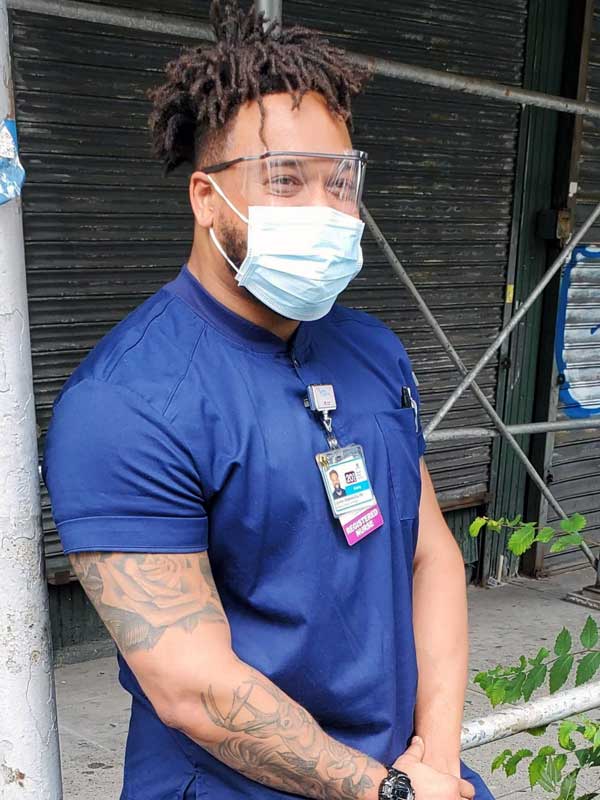 Ugo Eze is an oncology nurse, real estate investor, and podcast host [more]
Ugo Eze is an oncology nurse, real estate investor, and podcast host [more] Ugo Eze: Oncology Nurse
My professional career is the furthest thing from a linear trajectory but as English majors, we know that makes for the best stories. After graduating, I was rejected from ten PhD programs! While that was immensely heartbreaking, it was one of the best things that happened for me because I hated reading and writing critical theory with a passion! After that, I worked at Queens College for a while as a Teaching Assistant in the office of the Vice President of Student Affairs. While there, I helped write and publish a book on leadership, entitled “Let The Games Begin: A Guide to Self Exploration and Team Building Activities!” I was then accepted into the Urban Affairs Masters program at QC. Around the same time, I started a job as a copywriter writer for Marc Ecko Enterprises, which was pretty cool. I had always wanted to be in the “industry.”
But it turns out, the industry didn’t want me! So after getting let go from there, I decided to close that chapter in my life. I wanted to do something that spoke to my heart, was more fulfilling for me and had job security. After having a spiritual revelation on the NYC subway, I knew I was going to try and become a nurse. It took years to get there and the journey required everything I had but I made it. I had to take almost all the science courses required and then complete an accelerated nursing program. I did this all, while working and taking care of my elderly father. And in true literary beautiful sadness, my dear father passed away from prostate cancer, one day after I told him that I passed my nursing board exams.
In addition to being a nurse, I have a podcast, “In Search of Hope”, which can be found on major podcast streaming platforms, where we get to share stories of hope and perseverance. Also, my wife and I have also become real estate investors and will continue to grow there as well.
There is a deep link between being an English major and an oncology nurse. Both recognize that everyone has a story and every story eventually ends. But there is beauty between the pages. Both mine and yours. If you want to hear more of my story, check out the podcast or reach out to me on LinkedIn or Instagram @mrugoeze.
 Timothy So is an Emergency Medical Technician who works on the frontlines, driving an ambulance [more]
Timothy So is an Emergency Medical Technician who works on the frontlines, driving an ambulance [more] Timothy So: Emergency Medical Technician
Hey, I am Tim, and I currently work as an Emergency Medical Technician (EMT), moving on to becoming a paramedic! I graduated from Queens College in 2018 as an English major with a focus in pre-medicine. My time at Queens College was a rollercoaster, in my first two years I was a mess. I was working full time and going to school full time just taking general requirements to just check off what I had to complete for a degree. This time was the hardest for me. I struggled finding my motivation to go to school, and especially due to financial problems at home, I told myself that working was more important than school. I suddenly stopped going to class and doing the work needed. I became pretty lazy with school as I lost all drive. I had no guidance and as a result I failed two classes my first year. My second year I was placed on academic probation and actually was kicked out, having to appeal to get back in and fix the mess I made.
As I look back now, I realize I just didn’t know what I wanted to do. I went to school because it was the “right thing to do” and I thought it’d make my family happy. I ended up taking a year off and picked up a second job. Near the end of the year, I realized I was still missing something. There was no goal in sight, and I was just going through the motions. I came back to school to figure out what to do. With the help of the amazing counselors in Frese Hall and my peers, I was able to get back into school and try again.
I was given the advice of choosing a major, and at the time I wasn’t sure if I wanted to do medicine. So I chose English because I liked reading and was decent at writing essays, and to be real honest, it was mostly because I had the most credits in English done and it meant a faster path to graduating. While I am sure it isn’t the most ideal way of choosing a major, it changed my life. Because I chose English, I was able to find my path and make changes for my future. Thinking critically, analyzing texts, and writing essays aren’t what I do as an EMT, they have definitely made better at my job. I write some pretty good patient care reports and narrative thanks to my English classes. I read charts and medical journals often, as medicine is my career choice, and the skills I obtained in class have came in handy.
What I just want to say is that, I struggled a lot in college and it took me a while to find my way. However, the English department staff, my studies, and the resources at Queens College helped me turn my life around and focused me on finding my career path and goals. I entered the school with not a clue on what I was going to do. I had so many different career choices in mind, and I realized through struggling those first two years at school that my passion was medicine–and specifically patient care. Many co-workers ask, why did I stick with English if I decided to do medicine? Really it is because English helped me question and analyze everything, be more critical and really express myself in way that impacted me and has helped me grow. I remember sitting in Professor Tougaw’s class, Writing about Popular Music, and getting the chance to make a mixtape of songs chronicling a day of EMS work—and writing about it, sharing with the class a mixtape that creates a picture of my work. I felt great, I was able to think about my work in a way I never thought of before and was able to share it with others.
The things I have learned and gained from school reignited my passion and drive, and now I am going on to the next step of Emergency medicine, which is paramedicine, and will keep pushing on to nursing or med school after that. My advice is just to continue to put the work in. Your time in undergraduate is to find yourself if you haven’t already and put you on the path to bigger and better things. It has for me and the struggles you go through and the things you learn at school will build you up.
I remember hearing that the first case of this new virus had touched home in the U.S—in Washington State—back in January 2020. I’ll admit, I was alert to it, but I wasn’t too worried. Snap to the present. It has now become my life. As of April 20th, 2020, only three short months later, there are an estimated 746,625 cases in the U.S and 238,138 cases here at home in New York State. It has exploded into this huge pandemic and has changed a lot of my work. My experience right now has been two-fold: local and federal. I was given the opportunity to work with FEMA and the Federal government in a disaster response team. I was away from my house for two weeks (some are there for 30 days!). We were blessed to be able to get a hotel, but also sometimes we had to sleep in the ambulance. Being on the clock 24/7, we helped alleviate the city’s 911 system by adding more units to the streets or do transports with COVID-positive patients to the temporary hospitals on the USS Comfort and the Jacob Javits Center. What is amazing is that EMTs and paramedics all around the country have come together as one under FEMA to help flatten the curve and fix the situation. In my team, I had people from NYC, Indiana, Georgia, and Texas. With call numbers reaching record highs every day and the rate of cases always increasing—the highest number is usually yearly 5000, but since the middle of march calls were hitting 7400 a day—the workload was intense sometimes, but with time the process has become more efficient and things have been getting done.
Locally, working for a private ambulance company in NYC and Yonkers 911, the job has been a bit different. The same resources are not available. As the pandemic has been developing, so has the world of EMS. Hospitals and their workers are overwhelmed. ERs are packed with people, with deceased patients next to them due to the lack of space. Cardiac arrests have increased more than five times as the virus claims more lives. In addition, there are problems with equipment. We are trained on proper protective equipment to wear for particular patients. However, my co-workers and I joke about how many times the guidelines on proper protective equipment have been changed. During the first two weeks, we ran out of gowns, masks. and cleaning wipes. We were told to re-wear masks and clean them with a sanitizing wipes for extended periods times—for items designed for single use. Sometimes these situations are dire. I have seen co-workers getting sick due to COVID exposure as a result of lack of information or equipment. Problems sometimes even reach home, as COVID panic has affected some healthcare workers, including me—for example, and being forced to move by landlords. Because of our job, there are risks of bringing the virus home. There are a lot of problems, but even in the face of the virus and its rippling effects, I know many amazing people that continue to go to work and face the risks head on to help improve this situation. While all this is terrible, with worldwide effects, and things may look bleak at points, I’m sometimes in awe at the tenacity and strength of the people working on the problem—not only my coworkers on the frontlines, but the people adhering to social prevention strategies. It’s all a team effort, and as a team we can flatten the curve and get things back to a normalcy. While things may look dark, we persevere. That’s amazing.
Check out Tim’s “EMS Mixtape” essay here.
 Jorge K. Cruz is a painter doing an artist residency with Tracey Emin in the United Kingdom [more]
Jorge K. Cruz is a painter doing an artist residency with Tracey Emin in the United Kingdom [more] Jorge K. Cruz: Painter
My name is Jorge K. Cruz and I am a painter. I’m currently attending an 18-month artist residency in Margate, UK. A residency created and led by artist Tracey Emin. The residency is helping me focus on my work, and teaching me professional skills for exhibiting and selling my art. I paint full-time. I applied and got selected after a competitive and thorough examination of my artwork.
Writing is such an essential skill that can be applied literally to anything in life. I’ve never stopped writing since I graduated from Queens College. It has become a part of my creative process as well. I’m really happy that I completed this degree. While at QC, I found writers that have influenced my art such as T. S. Eliot, W. B. Yeats, and the poetry of Marina Tsvetaeva. The exposure to different authors has helped me cultivate a deeper understanding of my art. Writing poetry, for me, is akin to making art and music.
I remember fondly the memoir writing senior seminar, as it allowed me to end my degree with a clear understanding of who I am. It was one of the first times I felt seen and heard on campus. Taking the class was the best decision I made during my time at Queens College. In my view, the English degree is at best experienced as a creative endeavor of the heart, mind, and soul, rather than as a practical tool to make money. My advice would be, change is a constant, and change is good, nothing to be afraid of.
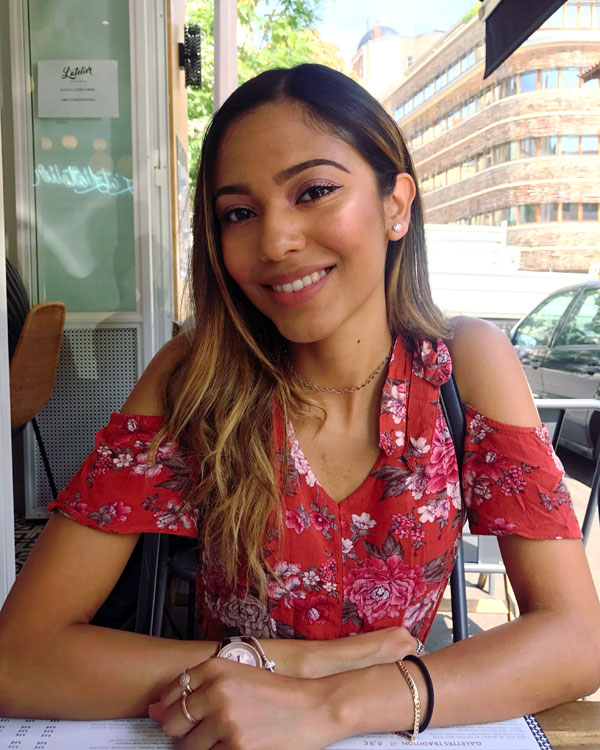 Kelly Santana is pursuing a Master of Arts in Teaching (MAT) at NYU—and hopes to publish a children’s book [more]
Kelly Santana is pursuing a Master of Arts in Teaching (MAT) at NYU—and hopes to publish a children’s book [more] Kelly Santana: Teacher & Writer
I remember sitting on the rug of my kindergarten class, listening to my teacher read, and realizing I knew what I wanted to do with my life. At the tender age of five, I had already decided what my career goal would be. I’d spend my days racing home from school to set up my chalk board, align my stuffed animals, and teach them what I had just learned. Growing up, all I wanted to do was become an early childhood educator. Born and raised in Queens, I also knew which school would be the perfect start for accomplishing my goal: Queens College. Throughout the years, I never questioned my decision to become an educator, but things changed once I took my first creative writing course.
I’ve always had a love for reading and writing, and after taking my first creative writing course in college, I knew I wanted to study literature and refine my writing skills. In a moment of clarity, taking even me by surprise, I declared my major in English and didn’t look back. I knew it was important for me to explore a hidden passion I had never put much thought into. I’d decided I wanted to focus my time on this specific major because it filled me with a drive and joy I knew was important for me. The QC English program opened up a whole new world I truly enjoyed; one which I hadn’t previously taken the time to notice. Since graduating, I have spent a lot of my time researching the intricacies of publishing and working on my own writing craft. After finishing my day at work at a pediatric doctor’s office, I work on developing my own writing style and ideas. A personal goal of mine is to one day publish my own children’s book.
Moving ahead, I know that my love for English literature and passion for teaching will make a wonderful combination. I plan to start my Masters in Secondary Education this summer at NYU. If not for the wonderful educators at QC who took the time to invest in my own potential, I would have never realized that teaching English would be the perfect career path to take. This program allowed me to learn so much about literature and its importance in our world, and also helped me discover my own voice as a writer. The English Major and Honors Seminar have fully prepared me to move forward in my graduate study and new career path. They not only supplied me with the proper education I needed looking ahead, but also helped me find my true passions in life and fill me with renewed purpose.
Connect with Kelly on Linked-In.
 Gauthier Giacomoni is an assignment editor at CBS News [more]
Gauthier Giacomoni is an assignment editor at CBS News [more] Gauthier Giacomoni: Assignment Editor, CBS News
This might sound trite, but I honestly think that one of the biggest impacts being an English major has had on me is teach me to write (a fierce editing habit is implied).
In our digital age, the written word is often the first medium in which people have a chance to make a good impression. Whether it’s building a website, sending an email, putting together a resume and cover letter, or reaching out to someone on LinkedIn, writing is imperative. There is also something to be said for developing your own voice. The way you express your thoughts “on paper” gives people a sense of who you are. Also, let’s not forget that more and more employers are also checking out applicants on text-heavy social media.
Granted, having memorized William Carlos Williams’ “This is Just to Say” is probably not going to make a huge difference in your day to day life (unless, of course, you derived some sort of special meaning from Williams’ poem that brings you joy). The same goes for understanding Mikhail Bakhtin’s thoughts on what makes good literature (although, I should note that name-dropping Bakhtin can be a hit at cocktail parties), but being able to wrestle the point out of complex and sometimes contrary texts is valuable.
Those are two pragmatic skills that are applicable to jobs across many industries.
I’ve been working for CBS Radio News since 2012. From an entry-level position I worked my way up to staff writer and now assignment editor. My B.A. from Queens College was not enough on its own, but my experience at QC was instrumental nonetheless.
First of all, I joined the student run radio station (yes, there is one) and fell in love with the medium. I also took media studies classes on radio and audio production. Professor Tougaw himself deserves a fair amount of credit (whether I’ve actually said this to him yet or not I can’t recall). During his senior seminar he encouraged us to submit our theses in new media formats. Since he had introduced us to Radiolab (a radio show / podcast produced by the NYC based NPR station WNYC) and I was already interested in the field, I decided to produce mine in a radio format. Despite the production classes I’d taken, this was my first experience creating a complex narrative using audio. I stumbled my way through it and I had a great time doing it. It was one more factor that made me determined to get a job in radio.
I graduated from QC in 2009. Worked a menial job for a year while unsuccessfully applying to any radio job I came across. Finally, I decided that the experience and degree I had would not be sufficient to get me my dream job, so I applied to grad school. Some of the applications – including the one for Boston University (from which I hold my M.S.) – required samples of my work. This is where we circle back to the audio format senior thesis I submitted to Prof. Tougaw. I attached it to my application and was accepted. I was able to thrive at BU because of the production / editing skills I learned as an undergrad.
Since I work in news, there are a lot of skills I learned as an English major that I use constantly. Identifying the most important factors of a story is its own form of close reading. As a staff writer I would have to explain stories in just a few lines of text to be read on the air by anchors who may not be familiar with the story.
Connect with Gauthier on Linked-In.
 Cesar R. Bustamante Jr. is a journalist [more]
Cesar R. Bustamante Jr. is a journalist [more] Cesar R. Bustamante Jr.: Journalist
It’s been a little more than 10 years since I left Queens College, when the now late John Lewis spoke at my commencement, calling this school where Andrew Goodman came from “holy ground.” The rain seeped through my clothes but it would take years for me to soak in the significance of this legend talking at my graduation.
Here was the civil rights activist who marched with Martin Luther King Jr. through Selma, whose fight for equality would help make it possible for the Immigration and Nationality Act of 1965 to pass that almost certainly allowed my family and I to immigrate to the U.S. from the Philippines. Q.C. was strange that way, offering you layered experiences and deep wisdom you’d notice later. That’s especially true in my career as a journalist with my English major from Q.C.
One day I’m studying Native American lore for a class, then years later I’m interviewing a librarian collecting accounts of tribal communities’ struggles in the U.S. One day I’m talking Lord of the Rings with a medievalist in the English Department, later I’m interviewing a radio host who chatted with J.R.R Tolkien while he was alive. One day I’m drafting a paper about comic-book superheroes for a class, later I’m interviewing a former editor at DC Comics about the anniversary of Superman’s introduction and covering N.Y. Comic Con for the Daily News.
I can go on and on about how what I learned from Q.C. has echoes in my life and work after graduating. But none of that work would have existed without the vital support of professors in the English Department who told this self-conscious Filipino immigrant that his voice had value and encouraged him when he was first rejected after applying to a graduate school of journalism.
The rain during my graduation distracted me from that ceremony’s important message: black activists like John Lewis helped make it possible for me to immigrate to the U.S., well-meaning professors like those in Q.C. helped me find a fuller life here. I’m still letting it sink in how lucky I am all these years later.
Connect with Cesar on Linkedin.
 Sahla Zawril has a Master of Arts in Teaching and now is People Experience Manager at an Apple retail location [more]
Sahla Zawril has a Master of Arts in Teaching and now is People Experience Manager at an Apple retail location [more] Sahla Zawril: People Experience Manager
After graduating with a BA in English I went on to pursue my Masters of Arts in Teaching (Elementary Education Grades 1-6). I was also simultaneously working for Apple Inc. as a Business Account Manager. Having an English degree supported my confidence in hosting briefings with C-Level professionals, presentations, written communication, and so much more. My Education degree provided additional skills to add to my tool belt such as planning, organization, and managing diversity to name a few.
I was able to be a part of incredible projects that led me to make an impact through business organizations. I now lead a retail team and oversee the People Experience at one of Apple’s retail locations. I get to be a part of hiring/staffing, training, volunteering, supporting our inclusion & diversity, employee development and coaching. Though I didn’t take a traditional path and become a writer or teacher I love what I do. I owe my career to my background in English and Education both of which were possible through the incredible programs at Queens College.
 Emily Abrams is a paralegal with the U.S. Attorney’s Office [more]
Emily Abrams is a paralegal with the U.S. Attorney’s Office [more] Emily Abrams: Paralegal, US Attorney’s Office
Hi there, I’m Emily Abrams and I’m currently a paralegal with the United States Attorney’s Office for the Southern District of New York. I graduated from Queens College in 2019, where I also majored in Political Science and American Studies. It is surprising how fast my first year out of college went by. Looking back on my time at Queens College, and specifically my experience within the English Department, I still genuinely believe that the people here and the education I received helped me get to where I am today.
There are both big and little things that stick out in my mind about the QC English Department. Finding a sense of community amidst a heavily commuter student body was a big thing for me. Professors, peers, and the Writing Center all took time and care to help me grow as a writer and a person. Even those dreaded peer review sessions meant a lot to me. Whether it was the inside jokes I had with new peers in class or Office Hours where I talked through my fears about my term papers, I knew I had found a unique and supportive community. I didn’t realize this until my senior year, and the nostalgia I have for it all now is quite clear.
Oftentimes as English majors we are asked, “What are you going to do with this degree?” Maybe some panic kicks in, as it does for many and as it did for me. I often used that feeling to fuel my determination to succeed. At first, I chose the English major purely because of my love for reading, and maybe a bit of escapism from the Political Science coursework I was also doing (this was 2016, mind you). I discovered quickly that the rigor of my English classes was making me a stronger writer, more than any other social science class I was taking at the time. So I leaned in and declared myself an English major. I was learning how to effectively formulate, research, and support my arguments about the literature I was reading—and articulate those arguments both on paper and verbally in class discussions.
I honed the critical skills needed to be a successful paralegal and a future lawyer, and I didn’t even realize it in the moment: Digesting a lot of information, having an attention to detail, making sure to fact check, and so much more. So, when it came to marketing myself on the job market the spring before my graduation, that is exactly what I told employers. Because I was an English major, I argued that I had many of the transferrable skills necessary to succeed as a paralegal. On top of that I had ambition and a desire to learn more about the legal field alongside top attorneys. My takeaway from post-grad job hunt: 1) Never sell yourself short as an English major, 2) You really do have what it takes to succeed because of this major, so own it, and 3) Keep hustling for your dream job, whatever it may be. If you can digest and critique a class-assigned novel that’s over 500 pages in a week, you can do a lot!
My final words: college is hard work and the QC English Department is no exception. My advice: challenge yourself, try new courses, and see where it takes you. I miss dearly having the time to read novels and debate them in class with peers, many of whom have become best friends out of college. One year later and it all really does feel like it was just yesterday…
Connect with Emily on Linked-In.
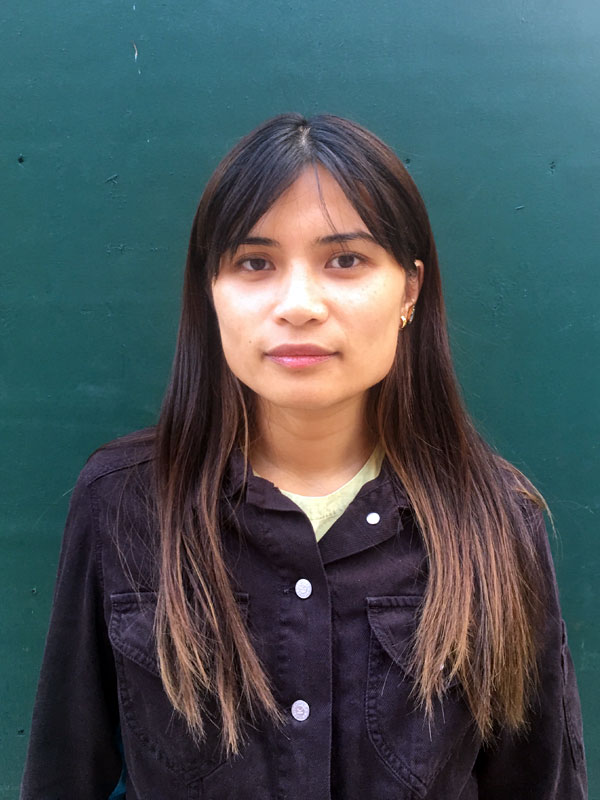 Danabelle Ignes is an art conservationist with plans to be an archivist [more]
Danabelle Ignes is an art conservationist with plans to be an archivist [more] Danabelle Ignes: Art Conservationist
My studies within the English department at Queens College gave me tools and frameworks to understand society and my place within it. I developed a broader vocabulary and a sense of place among critical conversations. A course in literature from the Americas with Anamaria Flores and a course in Asian American literature with Caroline Hong taught me the importance of representation of marginalized voices within the canon. A course on critical theory with David Richter gave me a vocabulary and a history of criticism to draw from. These professors also instilled in me a sensitivity and intolerance towards inequality and injustice. I have tried to use my skill set through volunteer work and helping economically disadvantaged people get back on the job market. Together, we’d navigate job search databases and computers and craft resumes and cover letters. These interactions reminded me of what a privileged position I hold and how important it is to share your knowledge.
During my junior year, Ryan Black nominated me for a fellowship at SILCS (Summer Institute in Literary and Cultural Studies) at Wheaton College. My cohort received funding and guidance towards graduate school applications and participated in a graduate level in literary and cultural theory. Although we’ve gone on to pursue a myriad of occupations—some went on to graduate school, one of my friends works in public service, another the army, another is a social studies teacher—we continue to connect on a passion for literature and theory.
My studies have also resurfaced in unexpected ways. During my senior year, I participated in the seminar “Dreams” with Jason Tougaw. We studied psychoanalytic and cognitive theory as well as other literature exploring the concept of the mind. Several years ago, I worked as an assistant on a web series profiling how different scientists think of the mind. Though I was hired to prepare lights and cameras and operate mics, I was able to contribute conceptually by drawing from my readings in that course.
I guess what I have done with my English major is sort of indirect and not particularly traditional but the skills and knowledge I developed have been invaluable. For the past several years I have worked in art conservation studios. The day-to-day tasks involve examining artwork, restoring them, documenting our treatment, and writing reports. The process is not so different from planning and writing research papers. Additionally, each artwork has a unique material, historical, and conceptual context that must be taken into account. Every intervention and movement affects the history and reception of an artwork. My interest in history and cultural movements began in college. Today, I am completing graduate coursework towards an archivist degree. My creative work—whether it is writing, painting, or filmmaking—requires focus, various literacies, and resourcefulness.
If you asked me immediately after I graduated how I felt about studying English, you might’ve received a very cynical answer. For a few years during and after college I was a barista, an embarrassing stereotype. I have befriended others with English degrees while working at coffee shops and sad temp jobs. We have bonded over love of reading and our insecurities about having “useless” degrees. However, research skills and imagination go such a long way and I hope it’s some comfort that things have worked out professionally. My fellow former barista is now a librarian and my fellow former paper pusher is herbalist and poet. Other friends have ended up with positions in local politics, education, advertising, marketing, and tech companies. Despite our occupations and titles, we still exchange poetry, essays, and short stories for edits and critique.
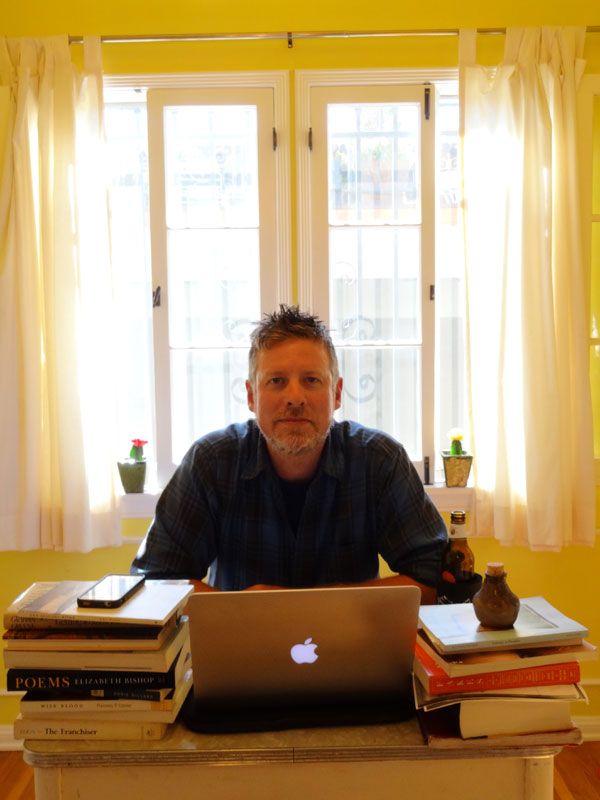 Scott Cheshire is a novelist, the author of High as the Horses Bridles. He regularly publishes in high-profile literary journals [more]
Scott Cheshire is a novelist, the author of High as the Horses Bridles. He regularly publishes in high-profile literary journals [more] Scott Cheshire: Novelist
In 2014 I was on a publishing panel at a writers’ conference here in New York City. My first novel had just come out and I was thrilled to be invited and sit on a panel that included some friends and peers who had published several books more than me. I remember acutely the first question from the audience, after a Q & A with the moderator. The question was from a young man: What do you say when someone asks what you do for a living? One writer said rather automatically: I’m a college teacher. His name was Justin and he had published four books by then. I was a bit shocked by his response. When the microphone came my way, I said proudly: I’m a writer. All the others looked my way, and gave a knowing smile. Six years later, I know the irony.
In 2006, when I was 33, I applied to Queens College, having never been to university before. I was a bartender, who wrote, and served drinks while obsessing over story ideas silently. I was also a serious reader. I had no idea that being an English major would satisfy both urges overwhelmingly. After finishing at Queens College, I went on to get my MFA in Fiction Writing at Hunter College. I could not have done this without the support of the English Department and my mentors here. The Masters was key in getting my novel published—advisement, connections, an up-close and practical view of how a writer survives. But my ongoing relationships with Queens College mentors were equally influential. After the MFA I worked a handful of jobs while working on my first novel. I was a waiter, a bartender (again), a paperback editor at Picador, and taught writing in private workshops, all the while writing on the side.
I’m proud to say in the midst of all this I wrote and published several short stories and essays in national journals, including One Story magazine and Harper’s. I became a book critic for the L.A. Times, and, with two friends, started an online international literary journal, The Scofield. I remain its managing editor. The novel, High as the Horses’ Bridles, came out in 2014, and was published to critical acclaim. But perhaps most unexpected (and strange) and providing good balance was bartending on television’s Bravo’s Watch What Happens, Live with Andy Cohen. It was surreal. Some of my more “literary” friends did not approve, but seeing Andy hold my novel up to the camera still makes its way into my waking dreams. Writing is a hustle, and I have been hustling until I got here, right here, at Queens College, graciously back where I started. Where I’m a college teacher, a college teacher who writes.
Connect with Scott on Linked-In.
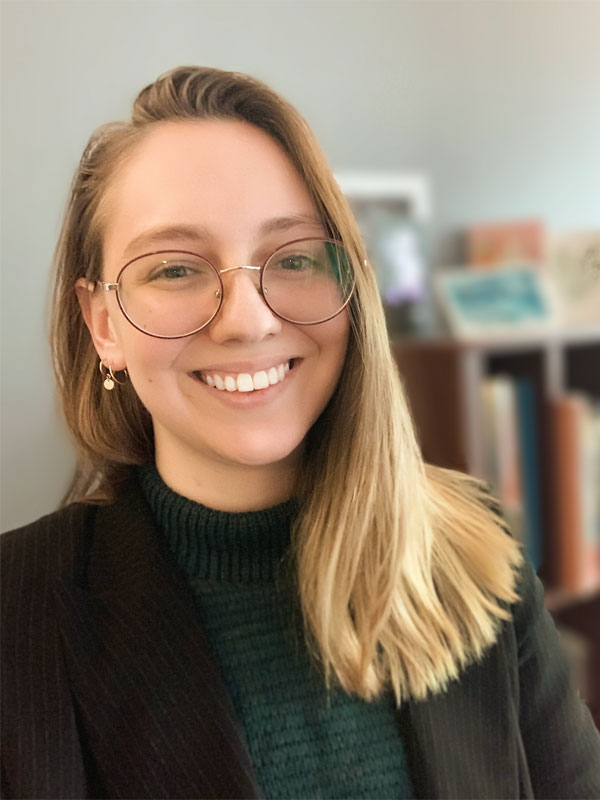 Michelle Coleman transitioned from high school teaching to a career in student advising at Hunter College [more]
Michelle Coleman transitioned from high school teaching to a career in student advising at Hunter College [more] Michelle Coleman: Student Adviser
I had always wanted to attend Queens College. During my childhood, I lived across the street from campus, spending my early years swordfighting using branches that had fallen onto the Quad. I spent birthdays in the giant egg-like spheres outside of Klapper Hall. So, when the time came to apply for college, it was a no-brainer. However, as I tried out major after major, nothing felt quite right. I turned to writing as my solace, hoping the right fit for me would bonk me on the head out of the blue. In the meanwhile, I started working at the Writing Center at Queens College. I quickly fell in love with learning about others’ writing styles and helping my peers articulate in a paper what they were able to say so well in person. Writing quickly became my life and, although reading was a weakness and insecurity of mine, I decided to take the leap and major in English.
Studying English at Queens College transformed my life in a way that can’t help but sound like an exaggeration; I promise you that it’s all true. Not only did my confidence in my reading and writing skills soar, but I learned how to ask for help and how to explore new ideas. I enjoyed being able to choose the topic of every paper of mine; synthesizing research and performing my own, rather than reciting information from a textbook. I declared my major quite late, and so I immersed myself in performing feminist readings for an entire year and a half. Nearing the end of my year-long honors seminar, I was finishing up my thesis, a twenty-page paper that I never thought I’d be able to write. Upon graduation, I taught high school ELA for three years, and it helped me learn so much about myself and even the texts I’ve read time and time again. After working with students and missing the college atmosphere, I decided to continue my adventure and become an academic advisor. I’m currently advising Human Biology students at Hunter College and organizing additional writing workshops that I have the privilege to teach.
Queens College’s focus on inquiry-based learning in its English courses also forced me to look inside myself, helping me explore my values and inner conflicts by critically analyzing texts both within and trapped outside of the canon. During the last semester of my undergraduate English career, I made it my goal to focus on queer texts, specifically examining the experiences of transgender members of the LGBTQ+ community. I continued this work, taking queer literature courses as part of my graduate study in education, and I felt a passion to study the ways in which community can be a form of both advocacy and institutional resistance in education. With the support of my former undergraduate and graduate QC professors, I felt confident enough to try to enter a doctoral program. Now, I am an advisor by day and Urban Education PhD student at the CUNY Graduate Center by night. Though this is the most rigorous academic work I have done to date, I feel extremely prepared, thanks to my courses in the English major at QC. I learned how to approach reading, critical thinking, and writing in ways that nourish my mind, preserve self-care, and represent my authentic experiences. Studying English is not only a study of the past, but involves an analysis of our present and our potential futures. Bringing the methods of literary criticism to my work and study in education has invited me to open my mind, approach situations from multiple perspectives, and make written and verbal communication in English accessible to all those I work with and advocate for.
Connect with Michelle on Linked-In.
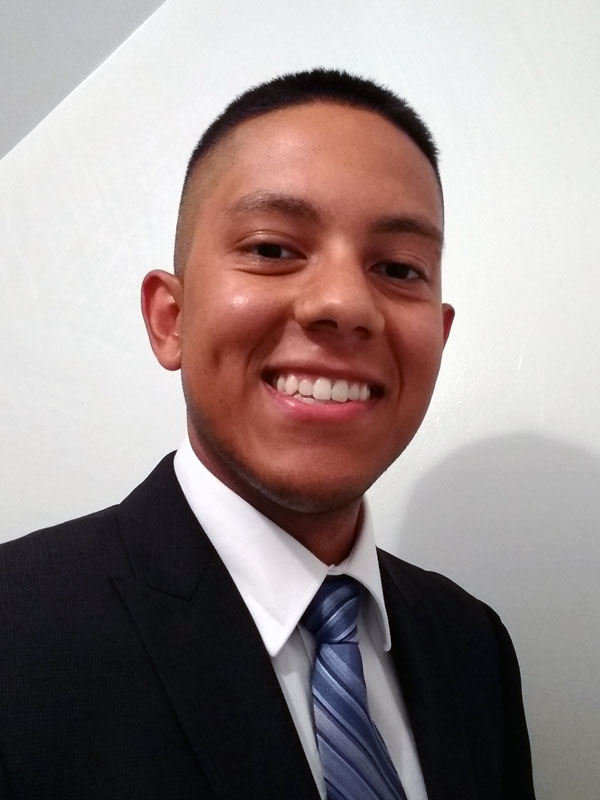 Omar Farooqi works as a business development representative at an insuretech company [more]
Omar Farooqi works as a business development representative at an insuretech company [more] Omar Farooqi: Business Development Representative
My sojourn to Queens College wasn’t born out of anything but necessity.
In the four years previous, I had already gone through what amounted to an epoch of collegiate experience at Hunter College—a period marred by paralysis, intellectual insecurity and self-doubt. That stultifying period was something like being adrift; you felt it most in the anonymity of being in a crowded subway car, or a mundane lecture hall, or a dimly lit tavern. I felt dissociative, taking classes out of habit not purpose, attending lectures out of routine not utility. And eventually you reach a place where you’ll do anything to break up the stasis, and like Hoagland’s “Sweet Ruin” I thought “how one day soon I might take this nervous paradise, bone and muscle of this extraordinary life, and with one deliberate gesture, like a man stepping on a stick, break it into halves… simply for the pleasure of the sound.”
My response was to leave my untenable situation at Hunter—an act of impulsiveness and some measure of desperation. I had accumulated plenty of credits but had no direction or waypoint to steer towards. I knew that writing was a strength of mine, but I couldn’t see the usefulness. My understanding of the collegiate experience was one that commodified a student’s education, and of liberal arts as an avenue towards financial instability. But for all my trepidation on the usefulness of my field, I found in the literature and words of great writers the source of what would be my salvation.
In the midst of that period following my hasty retreat, I found solace in the words of Guare, Baldwin and Sagan. I began to see writing and the studying of literature not just a means of understanding the contextual world around me, but as a means of interrogation. The tools of the writer: introspection, analysis and curiosity existed as a methodology in the pursuit of truth; but the understanding I sought remained my own motivations; the great interrogation was an interrogation of self. Guare writes, “we are all strangers to ourselves,” but he acknowledges that writing is the method and the craft to create a path to our unconscious, the place that reflects truly who we are, the place that is the most inaccessible.
This realization drove me to give the field of English lit a second chance, and I saw Queens College as a chance to reaffirm this new perspective. What I found was a spiritual kinship between the material that was taught and the professors who taught it. I had traded ambivalence for clarity, and each course challenged both the presuppositions I had about the world, but also about myself. I learned how to avoid myopic thinking, to communicate my positions effectively and concisely, and I began to appreciate the rigors and necessity of analytical and rational thought. What the Queens College English department gave me was the tools needed to continue this asymptotic approach to self-knowledge, and to the ability to think critically in a world that appears increasingly entropic and indiscernible.
I currently work as a business development representative at an insuretech company called Attune, where each and every day I employ my communicative skills to help small business owners get access to insurance. If I could leave a note for any anxious future English graduates it would be that the opportunities for success exist, the paths afforded to you are endless. As long as you continue the methodology, practice acute self-awareness and maintain a healthy skepticism you will give yourself the best chance.
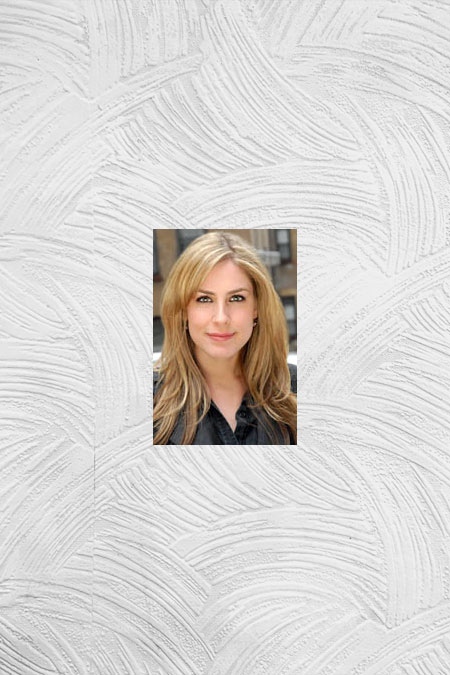 Elyse Price is a professional actor [more]
Elyse Price is a professional actor [more] Elyse Price, Actor
Hello! I’m Elyse and I’m a professional actress born and raised in Queens. Thank you fo taking the time to peruse my thoughts on what I have taken from my time studying literature at Queens College.
Firstly, let me say the people I met at QC completely flipped my life around. They remain my close circle and creative partners all these years later. I was a double major in English and Drama. Studying English in conjunction with performing profoundly helped me advance in my career thus far. Let’s just say– the power of rhetoric and knowing how to use it can get you far.
The skills you acquire can come out to play in such unexpected ways. Conversations I have had based at on Shakespeare or Dream Theory or John Donne or whatever—these all make you a more interesting person. People will want to engage in conversation withyou. You know things! Not just how to sit in silence and use a calculator or code or trollthe Internet; you know about ideas. You know how to contribute to a conversation, andquestion things and argue a point. You have had discussions and debates about these ideas. You know the stories of people all around the world, people whose lives are completely different than your experience. You can draw on this knowledge in so many different ways, in so many different settings— job interviews, auditions, networking events, family dinners! You never know which future employer is a huge Jung fan. And these things are important! It is all about connection.
When I was getting ready to graduate from QC, I was preparing to apply to Graduate School for acting. This experience is beyond daunting because the competition is insane. I was ambitious and only applied to the top 3 schools in the country. I wasn’t worried about the audition part (okay, that’s a lie), but even more, I was terrified to sit down and write the dreaded STATEMENT OF PURPOSE. Well, when I finally sat my butt down and got to it, it was easy. Not the facing yourself part, but the part where I said, “Come on girl. How many papers have you had to write on a deadline with no sleep and a billion things on your mind on a topic that doesn’t interest you at all? And you got A’s! You can do this!” And I did. And I got an A! Well… there are no grades on those things, but I was accepted to a program that only accepts ten students a year. A straightforward example of how your writing skill, and ability to put your thoughts on the page and make them work for you in invaluable.
At school, I kept writing, and finished my first play, which was produced in the Sky Festival at the American Conservatory Theater. Since then, I have been working nonstop in my field. I have toured and performed at the Moscow Art Theatre, The Town hall Theater of Galway, Ireland, Theatre Calgary in Alberta, and California Shakespeare Theatre. Since moving back to Queens, I have been working with my theater company (a company I started while at QC with other students) producing theater and acting. I was recently cast as the lead in a feature film and am in the middle of shooting as we speak!
(Multitasking… another thing I learned from my time at QC).
I’ve heard so many people say, “Well… yeah. I have an English major that will never do anything for me.” But that’s simply not true. You make it work for you. You have empowered yourself. You have the ideas and theories and stories and speeches of all the greats you have studied and written about and spoken about inside of you. And you actually know how to communicate! It always blows my mind how many people simply do not possess this skill. It will allow you to rise to the top faster than those who do not.
And part deux of that thought? I believe it is imperative to use this knowledge, this strength to pursue a career that actually excites you. What kind of job will make you excited to wake up in the morning? An editor? A playwright? A reporter? A Hotel Reviewer? Times are tough and starting salaries can be scary. But what will make that starter paycheck worth it is if you are working toward something that you want to be a part of. And every one of us has something that no one else has. Figuring that out is a really important step in the start of your journey as you—the grown up QC graduate who is now out in the “real world” stirring up trouble and making a difference. I still take side jobs to get the bills paid, and with every job I take, I make sure it is in some way related to my craft, or making me a better human, or something that I just flat out enjoy. At the end of the day the most important person is you—your health, your happiness, and maintaining your passion. You have the skills to do that. So go do it!
All the best,
Elyse
PS: My sincere apologies for my abuse of the exclamation point. It’s always been a problem… tsk tsk…bad English major!
Connect with Elyse on LinkedIn.
 Rafael Campbell is a video game writer [more]
Rafael Campbell is a video game writer [more] Rafael Campbell: Video Game Writer
During the later semesters of my time at Queens College, I became a warehouse associate for a pharmaceutical company known as AmerisourceBergen. As of April 2023, I continue to occupy that position although my long term career goal of becoming a video game writer seems closer to reality then it’s ever been.
In the year 2020, towards the end of my penultimate semester at Queens College, I discovered an advertisement for a remote game tester on the popular social platform LinkedIn. After applying, I was contacted by a member of the studio DVNC Tech, who requested that I join their discord channel to communicate with others looking to contribute to the game. The name of the intellectual property is Monochrome RPG, a 2D turn-based game set in the 1920’s where you play as a shy protagonist who uses silly puns to defeat their enemies. During my time in the discord, I participated in several creative bouts where the studio representatives would create contests involving different aspects of the game (writing, design, music, art, etc). For the writing enthusiasts, participants were instructed to create unique characters that would be implemented into the game’s narrative. Using the skills I learned in both fiction and creative writing classes, I devised a mob boss type character named Al Cologne (he was supposed to be a cologne bottle that closely resembled Al Capone). Although my submission was not approved, I would go on to participate in another bout where I created multiple item and move concepts that were accepted by the studio. When it came time to test the initial demo of the game, numerous individuals including myself, volunteered. While playing the demo over and over again (about five times), I wrote down any technical and grammatical errors and sent them to the studio representatives. It was around this time that I discovered another studio that was looking for individuals to join them in creating another video game. Curious of the newfound opportunity, I looked into it and decided to lend my skills as a dedicated writer. My contribution to Monochrome RPG slowly diminished until it was time to move on from the project. This decision would allow me to focus more on the narrative aspect of game development while I instilled myself as a core member of the studio Be Wild Games.
In 2021, as the dog days of summer paved the way for autumn’s arrival, a message coming from one of the many discord channels I belong to, quickly grabbed my attention. It emanated from someone unfamiliar to me, although its content was much more important. The individual was looking for like minded gamers who intended to gain experience by developing and releasing a video game. Naturally, this call to arms drove me to think of the possibilities that could come from such an unexpected opportunity. I immediately responded to the message and was asked a series of questions related to my level of expertise in game development. Soon after, I was invited to the company Discord channel, which would become the base of our operations. As the organization functions through remote membership, individuals from across north and south America work together as one unit to bring our wildest imaginations into reality. During my time with Be Wild Games, I have contributed heavily to our current project, entitled ODIN. With help from other members of the writing team, we’ve created numerous characters, story elements, item and weapon concepts as well as other written assets. Working alongside the game and level design teams, we’ve devised unique dialogue that will assist players in their journey as they traverse from area to area. Currently, our programmers are hard at work putting the finishing touches on the game’s initial demo so it can be presented to publishers in order to secure funding for the project. After years of playing video games as a lifelong hobby, the realization that writing for games can also become a career seems more like an inevitability as opposed to a distant dream.
You can contact Rafael via his LinkedIn page.
 Asheka Reid is a Communications specialist in the U.S. Navy [more]
Asheka Reid is a Communications specialist in the U.S. Navy [more] Asheka Reid: Mass Communications Specialist, U.S. Navy
When I first went to college, I had a plethora of people attempting to direct my path for selecting a major. Most of the choices were driven by the greater possibility of getting hired once I graduated. As a result, I attempted three different majors before finally taking charge of my own future. At that point, I would like to think that English chose me because I was just good enough to convince others that I would be successful with it. Selecting English as a major was my first step to emancipation. It was the first time that I really pushed back and said, “No, this is my future, not yours.”
Once I began studying at Queens College, I found a deeper love for English than I could have ever imagined. The entire department was filled with thoughtful and diverse instructors who encouraged free thinking. I was able to express myself on paper in ways that I never knew possible.
That first liberating step led me to ultimately join the U.S. Navy. I signed over my freedom to the military for a greater freedom only few could understand. Despite having a degree, I had to enlist instead of getting commissioned because I was not a U.S. citizen. I did over two years of hard labor as an undesignated seaman before I got a rate: one’s occupational specialization. I selected Mass Communications Specialist (MC), which is the closest thing to my degree that I could have hoped for in the military. It is a combination of journalism, photography, videography, and graphic design. I found that the work ethic I developed in college proved helpful in both obtaining and completing the technical course for my rate.
I still do not know how long I plan to stay in the military. Right now, I go by the title, Mass Communications Specialist 3rd Class. But, I know that my relationship with English is far from over. I may soon bear the title ‘author’ or maybe even ‘professor’ someday. Either way, I am excited for whatever the future may hold.
Connect with Asheka on Linked-In.
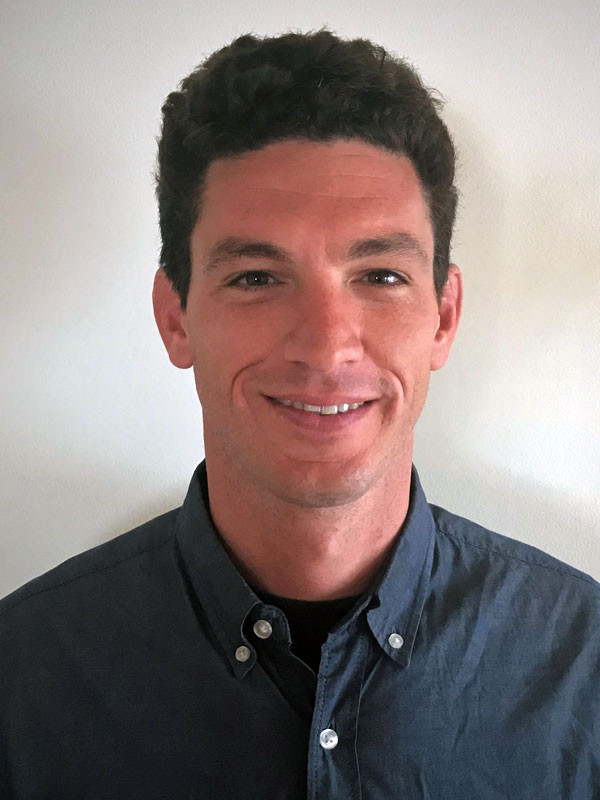 Shane Hanlon works for Doctors without Borders with posts in The Central African Republic, India, and Panama [more]
Shane Hanlon works for Doctors without Borders with posts in The Central African Republic, India, and Panama [more] Shane Hanlon, Logistics Manager, Doctors Without Borders
Studying English at Queens College changed my perception of daily life and understanding of how to live a meaningful one. I arrived aimless to my freshman year with minimal interest in education. My framework for success had been shaped by my town in Long Island, a twenty-minute drive from QC, where the criteria was mainly a fancy ride and being “jacked.” My default major, if anyone at the time asked, was Business. Upon the end of my education I graduated summa cum laude with a B.A. and entered the Peace Corps. Since then I have worked for various humanitarian organizations, both domestically and abroad, and earned a Master’s degree in Nonprofit Management and Policy. Currently, I am preparing go on my fifth long-term assignment as a Logistics Manager for Doctors Without Borders. What happened?
Reading and analyzing great works of literature and discussing them with dedicated professors and fellow students allowed me to identify my own values and ideas. In that forgiving space of diverse opinions, I was able to analyze the lives of different characters and narrative voices and, through that, create my own narrative rather than accept an inherited one. Books became companions; this has proved essential in the physically and emotionally taxing projects that I work in where I am cut off from most creature comforts along with family and friends. In my case, it has allowed me to live in such interesting places as The Central African Republic, India, Lebanon, Panama, Sudan and Uganda doing work which I am proud of. Before my freshman year I believe the values that define success for me now were already there, but studying literature at QC taught me to think and feel in a way which liberated them.
Connect with Shane on Linked-In.
 Natalie Bernabe is a Pre-K teacher considering returning to school for a Master’s Degree in education [more]
Natalie Bernabe is a Pre-K teacher considering returning to school for a Master’s Degree in education [more] Natalie Bernabe: Pre-K Teacher
I recently graduated from QC as an English major. Not with a concentration or a secondary major or even a focus. Just a BA in English. I considered getting a secondary major in Education, but I didn’t want to stay in school longer than I needed to. A degree is a degree, right? I was sure doors would swing wide open once I graduated. That sheet of paper was a testament to the grueling hours of studying, of multiple sleepless nights and eating ramen noodles for days on end. A sheet of paper my dog ended up ripping to shreds, but not before I presented it to the director of a Preschool, where I am currently teaching Pre-K.
I love English as a subject, and I’ve always loved books and writing- it’s my favorite subject. However, I’ve dabbled in various creative fields: photography, photoshop, costume play, and traditional art. Back in High School I was in the portfolio art program and that was the start of my countless unfinished projects, side interests and hobbies. I’m not exactly talentless but I’m glad I didn’t try to convince my mom that an out-of-state art college was necessary for my future. I knew I had to go to college, and I chose Queens College honestly for how close it was to my house.
Even though my high school was right next to Queensborough Community College, I refused to apply there. I do regret not going to QCC first, as I would have at least had an Associate degree before my Bachelor’s. I definitely recommend getting a liberal arts or any Associate degree from somewhere like QCC (or any community college) if you don’t know what you want to do. It’s better than wasting money trying to figure things out or burning through FASFA and especially TAP. They don’t tell you that it runs out–not after 4 full years but roughly 6-8 semesters. The Pell Grant is what pays for the majority of tuition, but TAP is what helps out with the excess tuition, books, transportation, and food. I really squandered that money in my early years in QC.
I also recommend applying for internships. I had a great experience with CUNY Service Corps, even if the pay wasn’t amazing. They had a job fair where you could apply for the specific company or job site you wanted to work for. I went with CAT, short for Creative Arts Team, an office that focused on their non-profit after-school program that utilized drama teachers to promote literacy. I was a glorified secretary/extra hand. I would help the various departments with filing or cleaning or data entry. My favorite part of the internship was when I had the chance to observe the after school program in person, and CAT had one set up in my former middle school. It was inspiring to see how these students’ test scores had improved, as well as their literacy level. It gave me a glimpse into how the arts can be used to benefit reading and writing skills and comprehension.
The woman I worked under during my internship moved on to accept a position as site director for the company Manhattan Youth. She worked at a Manhattan middle school and offered me a job as an After School Teaching Assistant. I said yes right away. After half a year, I took time off of school. I felt as though I found something worthwhile, and I was burnt out doing both full time. I loved working there; I stayed at that school for almost 3 years. The kids were wonderfu,l and I worked alongside some of the most talented and passionate people I’ve ever met. In the midst of working there, my site director left and things started to fall apart. The company wanted us to reapply if we wanted to continue being employed with them, and they wouldn’t be able to guarantee the school or even the borough we wanted. It was just really heartbreaking, to be honest. I loved that school and it hurt knowing I wouldn’t see any of the kids after they graduated. I had already started to lead classes for both Photography 101 and Comic Book Writing, and I had hoped to continue teaching them. That was my first experience writing lesson plans and I had already written them out for the last half of the year. So, needless to say I decided to finish school. I wasn’t going to stay with Manhattan Youth after that.
I don’t regret my deferment, but it didn’t exactly make for a smooth transition back to college. A shout-out to Professor Tougaw, who was such a valuable source of information, guidance and insight. His classes reminded of why I fell in love with English in the first place. The subject is so multidimensional and multifaceted, that even something as physically stimulating as music can be explored through writing. I’m known as someone who is ‘musically illiterate’ so his Writing About Music class was eye and ear opening. I am thankful I got to take his class before I graduated.
I applied to any and all job openings looking for a teaching assistant or teaching artist. The majority offered starting pay lower than the minimum wage but would ask for no less than a Bachelor’s degree. One school asked me if I knew how to operate a snowmobile, or else I’d have to shovel snow in the winter months. I knew I wanted to stay in the field of education, but I was seeing mostly dead-ends instead of potential jobs. I found Preschool of America on Linked-In and decided to apply. When I went in for the interview, the Director asked me whether I’d be willing to lead a room, as I’d applied for a Teaching Assistant position. One of the teachers was leaving, and her room was going to be available. I said yes.
I’ve been in the school for the past half year, and it’s been a series of highs and lows. I’ve seen these kids grow in ways I’ve never imagined, and I’ve had to write detailed lesson plans and come up with new and inventive ways to engage the students through stories, plays, artwork, crafts and more. Seeing them start to write out their own name is amazing, and it’s fulfilling to see their growth, academically and physically. The company is in the process of changing hands, and my school is now known by a different name. My Director is also leaving, and I can’t help but feel a sense of déjà vu. I’ve had to work throughout the summer, and I am considering returning to school for my Master’s so I can become a public school teacher. My initial goal was to set up my own after-school program, but with the Trump Administration cutting funding to most of the arts, I don’t think it’s possible in the near future.
I apologize for writing a bit of my life story in this testimonial. I felt that in order to relay what I’ve been able to utilize in my current position as a Pre-K teacher, I had to reflect on my academic career. I’m the first in my family to graduate college, and that’s an accomplishment in itself, yet at times I still feel stuck. I feel like I’m not doing enough or I should be doing better for myself, and I think that’s normal. I’m in no way stable right now, but I like to think I will be. The point is even after graduation you might not fall into your life plan or a steady and stable job and that’s okay. Small deviations off your path doesn’t mean you won’t get to your destination. It’s about the journey, right?
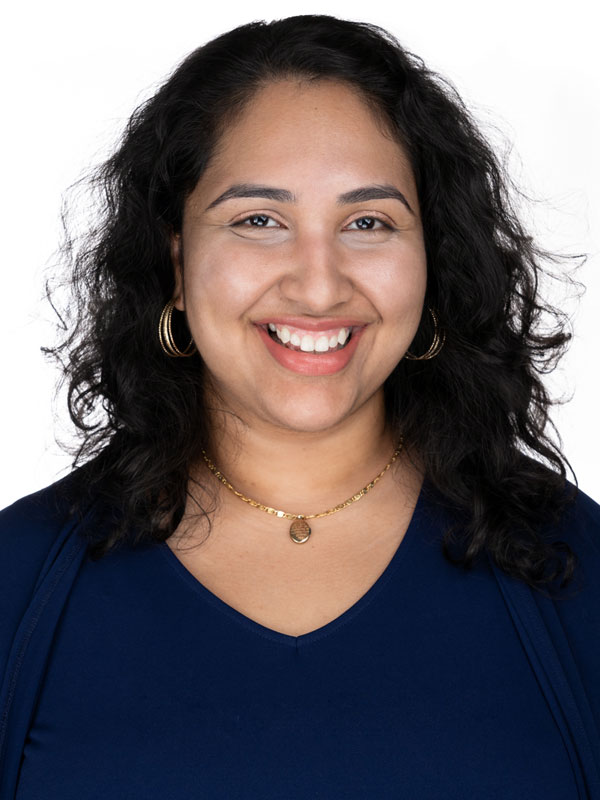 Stacey Ann Lorick is a recruiter for a charter school [more]
Stacey Ann Lorick is a recruiter for a charter school [more] Stacey Ann Lorick: Charter School Recruiter
As a Trinidadian-American, I was raised by two parents who valued three things that they passed along to me: faith, family, and education. The value of education was ingrained in my mind as the most powerful tool that I could ever possess. As early as I can remember, I was drawn to reading and writing. It was therapeutic at first. I wrote because it helped me be seen and gave me a voice. I had thoughts and opinions that never seemed to make sense out loud, but flowed effortlessly onto paper.
August 2008 marked the beginning of my first year at Queens College and I knew from my very first day that I would be an English major. There was no other field of study that I cared to hear about or thought to explore. Publishing was the plan. I would become a writer. This dream was impractical to most. There were family members who thought teaching would be the best route with my degree, while others wondered why major in English as the possibilities were not as lucrative as ones in other fields. I knew in my heart and gut that I made the right decision for me. The professors at Queens College helped shape the critical and creative thinker that I have become. The road to earning my 4.0 GPA was not easy. The essays that were graded in a top bracket at my high school were not so in college. Thankfully, I had professors who sparked an intellectual revolution in my mind. I went to office hours, rewrote several papers before their submission dates, and became an active participant in my classes.
It is not enough to simply be present or to be grateful for the opportunity to be there as a student. Seek knowledge. Seek different perspectives. Seek another way. Whether it was Victorian Literature, Graphic Novels, Asian American Literature, American Literature, or Shakespeare, there were common themes that continue to resonate with me. These themes include reading between the lines, listening for the unsaid, and challenging ideas. “Sticks and stones may break my bones, but words will never hurt me” is simply not true. Words have tremendous power. They can damage you just as easily as they can heal you. They can make you feel understood or leave you unheard. There is a responsibility to humanity and an accountability that cannot be ignored.
As a recruiter for an ed-tech company, I am in the very field that has always been a second home for me whether I wanted to admit it or not. To get to this place, I had to evaluate who I was as a person and determine what made me tick. Quite simply, I want to give hope to others. I want other people to know that there are options that are worth exploring as many wrestle with what they want and what they are told to want. Working as a Senior Talent Acquisition Specialist for General Assembly, I recruit for Product, Admissions, Finance, Legal, and Enterprise opportunities and am the thought partner for hiring teams and candidates. I work in a space that recognizes that the road to your passion may not be a traditional one nor does it need to be. With bootcamp courses, classes, and workshops in data, design, business and technology, we offer the chance to pivot and transform your career.
Connect with Stacey Ann on Linked-In.
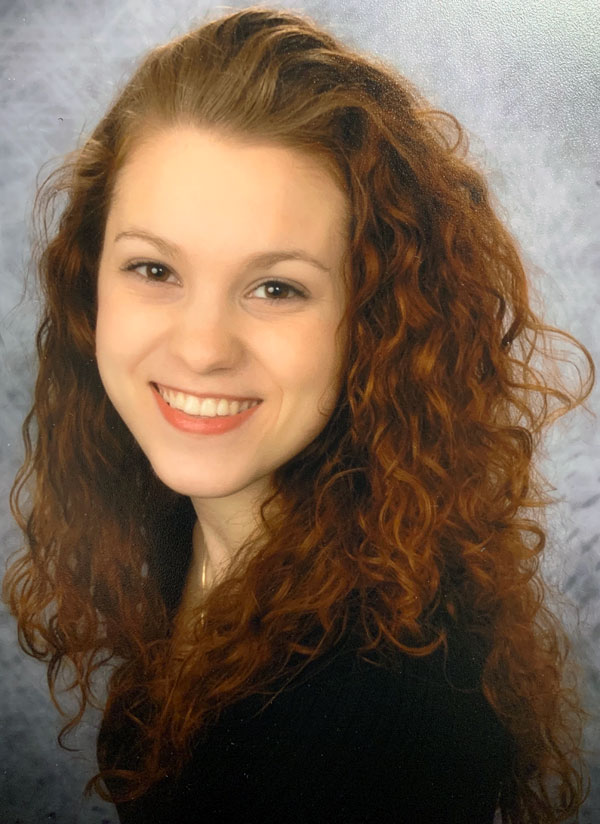 Caitlin Marziliano is a financial aid counselor at Marymount Manhattan College [more]
Caitlin Marziliano is a financial aid counselor at Marymount Manhattan College [more] Caitlin Marziliano: Financial Aid Counselor
To be honest, I was trying to think of the way I could have best answered it. You wanted us to talk a bit about how we have used our English degrees since graduating, but I actually haven’t really been working in my field. For the past year and a half I’ve been working in Marymount Manhattan College’s Financial Aid office– not what I had planned. I’ve accepted, however, that it has been a good place for me to save some money, grow as a professional, and earn a little experience until I can either afford to go back to school for my Masters degree, or get a different position in a college that actually offers a Master’s degree (MMC does not) and reap the benefits of God’s greatest gift to humanity: Tuition Remission.
It’s easy to be a little embarrassed about the fact that I worked so hard in school, but have since used the skills I learned from the QC English Dept. for little more than writing emails regarding FAFSA applications. It’s probably why I didn’t respond right away when you sent your email. The end goal is still in mind though and, if anything, the advice I would give to student’s graduating now is that despite how smart you are and how great your grades are, just like an A in a class, your goals and dreams will never just fall into your lap; you still have to wade through quite a lot of muck to get there and some of the stepping stones are not terribly glamorous, have no windows in the basement office, and will have you sitting next to a coworker who refuses to stop offering you peanuts from their desk drawer everyday even though you have literally never once accepted their offer. Not that I know from experience or anything…
Anyway, I’d say impress upon students that this phase is normal and perfectly okay. We, more than any generation before us, were raised in such an efficient and instant world and we have grown to expect the same kind of efficiency from ourselves. We must remember, however, how young we are and that we still have so much time ahead of us to do the things we want to do. With hard work, the phase of people hearing what you do and saying, “oh, well its a stepping stone,” or “hey, its a foot in the door,” will pass and those goals will finally be reached. Hell, we might even get a window some day (seriously though, I’m not kidding about this no sunlight thing. I’ve developed a vitamin D deficiency which is apparently not uncommon for Financial Aid workers because those offices are usually located in the basement of schools. Seriously, how messed up is that?? I feel like I’ve officially completed the first step of my evolution into a dungeon lady). QC English Department seniors, keep your eye on the prize and know that it’s okay. It all going to be fine. Keep working hard and we’ll be basking in the sunlight in no time.
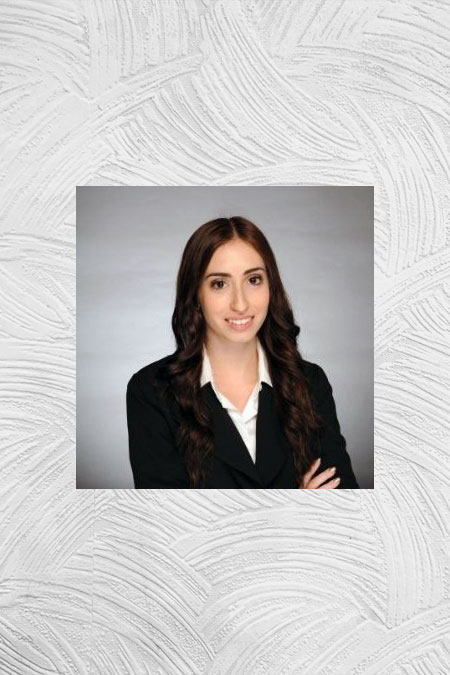 Cecile Wortman works as a staff attorney within a securities fraud practice [more]
Cecile Wortman works as a staff attorney within a securities fraud practice [more] Cecile Wortman: Attorney
In my time at Queens College, I completed a double major in English and Philosophy and a minor in Art History. I graduated Summa Cum Laude and was accepted into the Phi Beta Kappa Honor Society. As an English major, I worked on honing my writing and critical thinking skills which have been immensely useful in my life after college. I continued my education at the Benjamin N. Cardozo School of Law with a concentration in Intellectual Property and Information Law. I am now working as a Staff Attorney within the Securities Fraud practice at Bernstein Litowitz Berger & Grossmann.
Studying English has allowed me to appreciate that people can bring differing perspectives and interpretations to the same text. This has been essential to both the study of law and my work as an attorney. Throughout my course of study, I was able to analyze alternate meanings of given works of literature and understand the ramifications of being imprecise with language. In my daily life, this analysis is crucial for crafting an argument and anticipating a rebuttal. Furthermore, my senior seminar was a great addition to my education as an English major because it allowed me to develop my public speaking abilities. The seminar was a great opportunity to engage in an open exchange of ideas which I have had to do in law school and my career. Studying English at Queens College has enriched my life. I owe a debt of gratitude to all my wonderful professors who equipped me with the tools needed to pursue my career.
Connect with Cecile on Linked-In.
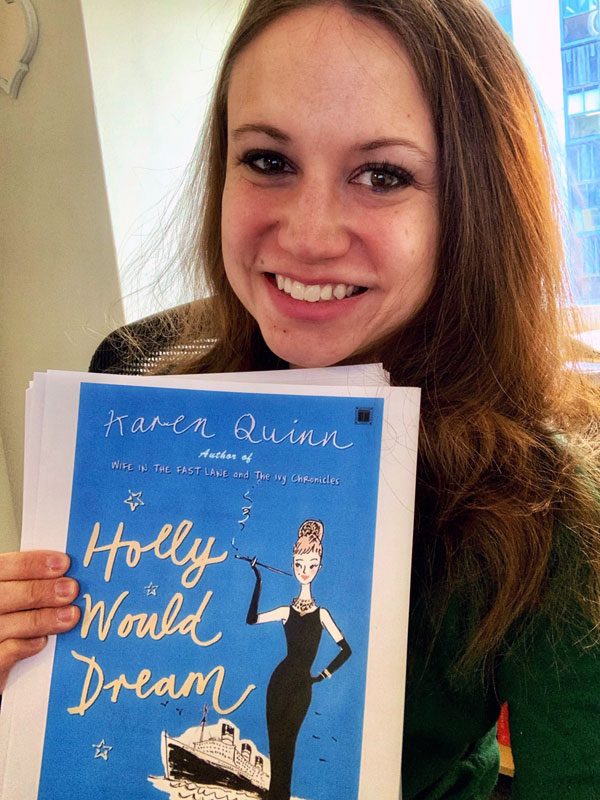 Sara Bowne works in book publishing at one of the “Big Five” New York firms [more]
Sara Bowne works in book publishing at one of the “Big Five” New York firms [more] Sara Bowne: Book Publishing
It’s been ten years since I graduated from Queens College in the spring of 2010 with a BA in English, but it wasn’t until the fall of 2014 that I started working in book publishing–aka, my dream industry, because what book nerd would not want to spend their day working on books?
Probably the two most frequent questions that I get asked when I mention what I do for a living (besides recommendations) is: do I get free books and do I spend my days reading books in my office. Yes. And no. Yes, I do get free books and have early access to all the books that my company publishes (and books from my friends who work in other publishing houses) which is a HUGE perk. Okay, who am I kidding, it is really one of the best parts of my job. But sadly, no, I do not sit in my office reading books all day long, even though I wish I could.
While getting into the industry is hard, it’s not impossible. Many people (myself not included) do it through internships. Internships are great. They give you a glimpse of the industry from the inside, let you discover different departments, and allow you to make connections with people who work where you want/hope to be. Connections are VERY important, because connections are how I landed a job in one of the Big 5.
I didn’t do internships, because I didn’t have the luxury to do so. While attending classes at Queens College at night, I worked full time as a legal assistant during the day. Once I graduated, I was exhausted and welcomed the time to myself that had once been occupied by school. I knew that I wanted to make a career change, I had made that decision while at Queens College, but I wasn’t sure how to go about it. I also wanted to walk into the industry with something more than a BA, so I went to NYU School of Professional Studies and obtained a Certificate in Book Publishing. While there I again made connections, and stayed in touch with a couple instructors (one of whom is the reason why I have my job today).
It’s been over 5 years since I began my career in book publishing, and though I am not in the editorial department as I had originally envisioned, I love the industry and I love what I do. It took a lot of hard work and sacrifice, but I made it, and I did it on my own. Were there times when I wanted to give up? Sure, but that’s normal. Whenever I felt like I was getting nowhere, I would force myself to step back and look at the bigger picture, look at my end goal. Would I be happy taking the easy way out and giving up the chance at my dream? If you answer yes, than it wasn’t really your dream, but if you answer no, don’t give up until you have reached your goal. It may not happen overnight, but when it does, trust me when I say that it will be worth it.
Connect with Sara on Linked-In.
 Sharon Tran is an Assistant Professor in the English Department at the University of Maryland, Baltimore County [more]
Sharon Tran is an Assistant Professor in the English Department at the University of Maryland, Baltimore County [more] Sharon Tran: English Professor
Hello! I am Sharon, and I currently work as an Assistant Professor in the English Department at the University of Maryland, Baltimore County. I entered Queens College with a very different vision of the career I would pursue. My parents had always pushed me toward the hard sciences, where I would be able to develop tangible, marketable skills that would set me up for a stable, lucrative STEM job. The English courses that I took at QC, however, ended up being the ones that I found the most intellectually stimulating and inspiring. They taught me how to think, speak, and write critically about different texts and the world I inhabit. Reading Edward Said’s Orientalism for the first time in Professor Jesse Schwartz’s class completely blew my mind and provided me with a whole new theoretical framework for apprehending gendered and racialized imperial power relations. For a short while, I managed to trick my parents (as well as myself) into believing that I was majoring in English with plans to apply for law school. By the end of junior year, I knew I had to come clean and finally told them that I wanted to pursue a PhD in English. They were very apprehensive about my choice but ultimately, supportive of my passion for studying literature. Upon graduation, I entered the English doctoral program at the University of California, Los Angeles and obtained my PhD in 2017.
I can say that studying English at QC has directly shaped and changed my life in major ways. It led me to move away from New York, where I have found new communities and wonderful peers, mentors, and friends. I have had the pleasure to learn from the brilliant faculty at UCLA and work with Rachel Lee, an amazing advisor who continues to challenge and push me intellectually with regards to my research on multiethnic American literatures and cultures. In the courses I have taught at UCLA, the University of Southern California (where I did one postdoctoral fellowship year), and UMBC, my current institution, I continue to draw on the teaching strategies and styles modeled by my excellent QC English professors such as Duncan Faherty, Caroline Hong, and Jason Tougaw, to only name few. Teaching continues to be, for me, one of the most rewarding aspects of being an academic and I hope to continue helping students become more critically engaged readers and writers in the world that they live.
Looking back at the original testimonial I composed, I described Queens College as the place where “I found myself falling precariously in love with literature.” That statement came from a place of intense anxiety as a graduate student struggling to make ends meet on my meager stipend and on the cusp of entering a highly competitive academic job market. My situation has since changed in dramatic ways. I feel very lucky and grateful to have obtained a tenure-track position at an institution with the most wonderful, supportive colleagues that a junior faculty member could ever hope for. However, I remain deeply aware of my privileged position and the fact that I am the exception, not the rule. Precarity in academia can be gleaned from the dwindling number of tenure-track jobs and the growing pool of part-time, contingent faculty without adequate healthcare benefits and who remain at the mercy of uncertain contract renewals. These structures and experiences of precarity have only been made more visible with the COVID-19 pandemic. At this juncture, the fallout for higher education is still unclear. I love what I do and have pushed myself to be more resilient, to not allow this sense of precarity to immobilize me when it comes to my research and teaching. At the same time, I do not believe that it is acceptable that faculty, staff, and students are increasingly compelled to embrace precarity as the norm and to figure out ways to repeatedly transform crisis and damage into productivity. I hope that in my role at UMBC, I will be able to facilitate the restructuring of higher education in more equitable and inclusive ways.
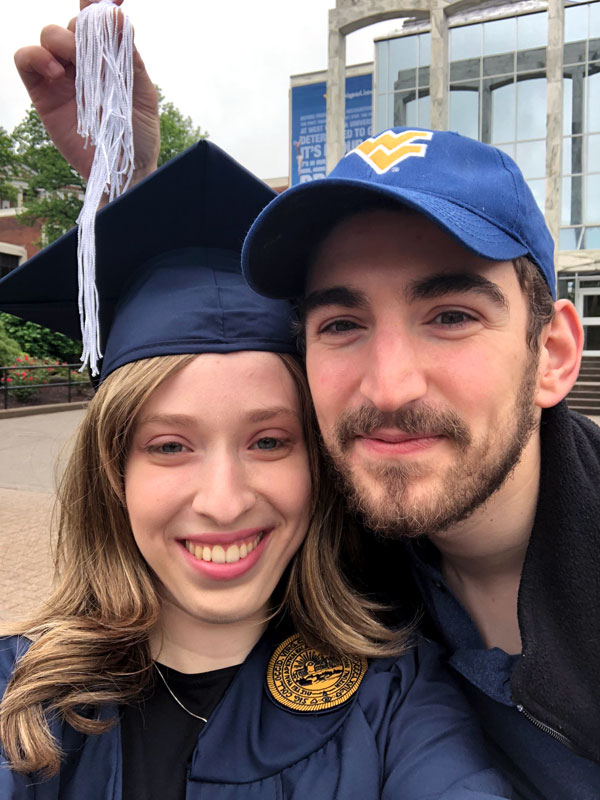 Chani Rubenstein earned her M.A. in English at West Virginia University, where she taught college-level courses [more]
Chani Rubenstein earned her M.A. in English at West Virginia University, where she taught college-level courses [more] Chani Rubenstein
I have always been a pragmatic person. While I’ll occasionally be moved by a sense of whimsy, it’s usually not before I’ve weighed my options carefully. For example, as I sat by a river at the age of sixteen, a frog jumped into my hand. As a lover of fairy-tales, I decided to give the slimy creature a closed-mouthed peck only after examining its coloring, and remembering that I had hand sanitizer in my purse (a well-stocked bag is essential for all adventurers—Samwise and Hermione have taught me well).
As a practical person, when it came to choosing a college to attend, I knew that Queens College was my best choice for a great education that would not leave me with crippling debt. I had always known that I wanted to teach, and as a lifelong lover of books, English made sense. While choosing classes for my first semester, I picked a Freshman Year Initiative course combination of English and educational theory.
My first class in the English department was a little rough. I struggled with the first few assignments—I stubbornly attempted to cling to my original ideas, and resented my professor’s urgings to revise. Despite knowing that I was right, I wanted to do well, so I tried doing what my instructor wanted, and was surprised to find that the pieces were actually improved. After learning the vital skill of revision, English class became a true pleasure. Each subsequent class pushed my writing and analytical skills further, and by the time I finished Professor Tougaw’s Honors Seminar, I was shocked by how my skills had been refined, although I still have trouble believing that my writing is any good until I’ve re-read whatever I’ve written objectively, and received feedback from others.
During my final year, I began researching my post-degree options. My pragmatic mind evaluated the situation’s circular logic: I knew that I would need to earn my MA within five years to retain my teaching degree, but degrees require money, and to get money, I would need to teach. Teaching while earning my degree was a possibility, but the rates of first-year burnout were a little too high for comfort. While deliberating my options, I received notice of a third possibility from Professor Tougaw—West Virginia University was taking applications for their fully-funded graduate school program. Students in this program would earn their graduate degrees in English while teaching introductory English classes to undergraduate students. It looked perfect, so I took my GRE’s, put together a portfolio, and sent in my application.
I loved my time at WVU. Teaching English on a college-level was amazing. Taking classes on a graduate level was transformative. I left the program with the ability to write publishable papers. I also managed to snag a wonderful husband.
I don’t know exactly what the future will hold, but I am grateful for where my decisions have taken me thus far. I know that I have marketable skills, and that the analytical thinking that I have refined during my time at Queens College will come in handy if I ever do decide to make a career change. I am glad that I pursued my passion, and know that I will continue to get much joy out of my ability to appreciate literary craft, hopefully passing that joy onto others as a mother and a teacher.
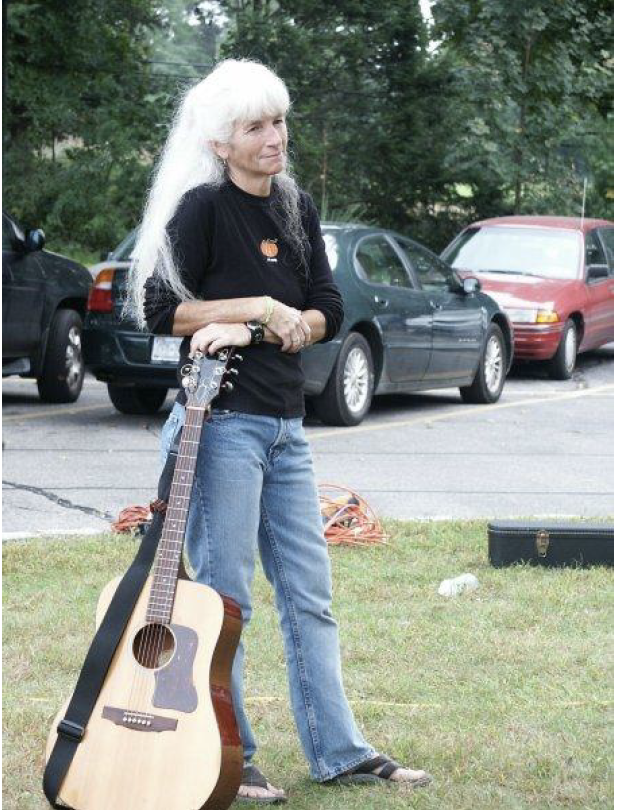 Lisa Patterson Lay is a writing instructor at Barry University in Miami [more]
Lisa Patterson Lay is a writing instructor at Barry University in Miami [more] Lisa Patterson Lay: Writing Teacher
QC, and especially that magical year of Professor Tougaw’s English Honors class, stays ever fresh in my mind. I draw upon those experiences daily. At Barry University in North Miami, FL., I tutor students (graduate and under-grad) who need help with their academic writing. From English, History, Speech, Chem and Bio labs, to Nursing papers and Doctoral Dissertations – if it has a written component, we are there. The student body is diverse, and international, which I love! I even got to practice my Japanese with one student who came in regularly! Nanto subarashi!
Language, both spoken and written, is a living, breathing thing. It influences our thinking and is used by every person at every moment of every day. I am often reminded of Professor Jeff Cassvan’s English Theory class, where we learned this vital lesson. I moved to South Florida four years ago, where every day is shorts day. I took my five kids snorkeling off the Florida Keys last Christmas Day! And, yes, they still come to mom with questions about their writing.
Connect with Lisa on Linked-In.
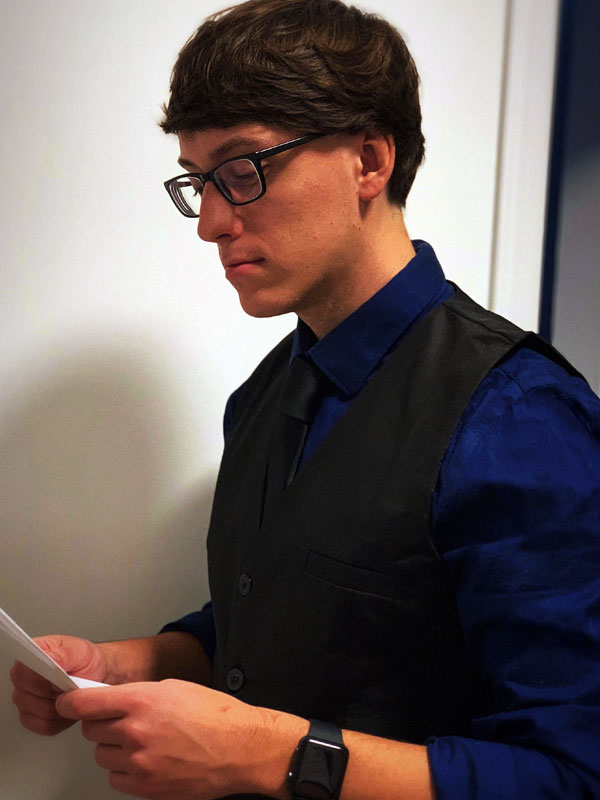 Brandon Hernandez is a Language Arts Instructor [more]
Brandon Hernandez is a Language Arts Instructor [more] Brandon Hernandez: English Language Arts teacher
Congratulations, you’re part of the minority. If you didn’t know, reading has always been a minority occupation. Drop a few books out on the sidewalk on a busy NYC street, leave them there, and see how many people pick any of them up or even look through them. You’ll get a few, but it won’t be many. Replace that book with an iPhone or diamond. Congratulations, you just started a riot. The difference between the book and the iPhone is similar to a portrait and a photograph. A photograph is a click, and there’s the image. On the other hand, a portrait is something that can be layered upon and layered, worked on, and allows you to think, and then rethink, and then again. That doesn’t mean you can’t gain an educational utility from these photographs, but there’s more depth to the portrait.
The portrait starts out as a blank canvas until it’s explored. You start this exploration by reading. When you read, something grips you. Something you want to investigate. You learn more and more about this topic or problem and start to gain the curiosity to contribute to it. That’s when the writing kicks in, and you pick up the paintbrush and finally touch the canvas. Writing is formalized thinking. You have your investigative topic, you start to summarize what you’re learning, iron out the points you agree with, the contradictions, and elegantly formulate your ideas through proper word choice, phrasing, sentence structure, and organization so your paragraphs are in proper order and sequencing so you have a coherent explanation or argument. As you do this, you’re already at the peak of your self. You’re integrating and fully engaging with your own personality by putting yourself straight and learning to critically think, honing your words, discovering what you believe to be true. This is when you start to speak and others start to listen. You start to explain yourself and your ideas to others and they respond with their thoughts or criticisms, helping you improve your self even more because someone else has now contributed to this investigation. Your investigation may not end either, meaning your canvas may not be finished. But that’s okay because sometimes it’s more important to be in love with the process than the end prize.
My name is Brandon Hernandez and I’m a second-year English Language Arts teacher for the Department of Education. Queens College guided me through my never-ending portrait. Each English course had a set of ideas to study and a way for students, and educators, to articulate those ideas through a series of reading, writing, speaking and listening. It wasn’t just a regurgitation of ideas, but an in-depth analysis of how we as individuals can strategize and entice one another to break down these ideas with a vision moving forward – which is the core of the humanities. Each course helped me become a better educator by illustrating what it truly means to think crucially. I was able to transfer the skills learned from these courses to a younger crowd of High School students by developing curricula around works I’ve explored such as Emerson, Poe, Shakespeare, and countless others. You may think, what good is a humanities degree? But once you engage in the courses at Queens College, you’ll soon realize that you will come out with an intensified ability to read, write, speak, listen, and think. The zenith of your being.
So, if there’s one piece of advice I can give, it would be: Continue to read. Continue to write. Continue to speak. Continue to listen. And, more importantly, continue to think.
Connect with Brandon on Linked-In.
 Frances Tran is an Assistant Professor of English at Florida State University [more]
Frances Tran is an Assistant Professor of English at Florida State University [more] Frances Tran: English Professor
Hi, I am Frances Tran and I currently work as an Assistant Professor of English at Florida State University. When I first entered Queens College in 2006, I had no intention of becoming an English major or pursuing a doctoral degree. As immigrants who wanted the best for their children, my parents believed that there were only two paths to a successful career and life in the United States: either become a doctor or a lawyer. They never imagined that I would become a different kind of doctor, one that does not operate in antiseptic offices or hospitals but rather teaches in classrooms and conducts research in libraries. Honestly, this was never a future I would have imagined for myself either, until I started studying English at Queens College.
It was almost by chance that I ended up in Jesse Schwartz’s “Introduction to Literary Theory” course, the first of many English classes that changed my outlook on what I wanted to do with my life and how I saw the world. It was in this class that I was first introduced to that elusive, mind-blowing thing called theory. Between reading works on psychoanalysis, Marxism, and feminist critique, I learned from Jesse the joy that comes from being completely unsettled and disoriented, to rethink the things I thought I knew. I learned that engaging theory isn’t just about applying various theoretical lenses to different texts but rather using the insights I gained from them to construct an alternative way of seeing and knowing- to create an argument that is uniquely my own. Although we discussed primarily literature in his class, I went through a period of seeing theory in all of the things I encountered, from movies and TV shows to random strangers’ conversations in the subway.
It was also at Jesse’s encouragement that I entered an essay I wrote for his class into the English department’s writing awards. At the prize ceremony, I met Duncan Faherty, who has influenced my life in more ways than I can say. He was the first person to float the idea of applying to graduate school for a doctoral degree in English; the first person who made me realize that I could turn my love for literature and theory into a career. And, I should add, that he helped turn it into more than just an idea; Duncan worked tirelessly to help me prepare my graduate school applications. I still remember with no small amount of horror the red marks he left on my writing sample that seemed to make the paper bleed. Still, those red marks were a sign of Duncan’s sincere support and care, the effort he put into making sure that I submitted the strongest essay possible. His mentorship helped sustain me throughout my time at Queens College and through the difficult years of grad school.
It was also through Duncan’s recommendation that I met so many other amazing professors at QC, including: Roger Sedarat, whose 1-page essay assignments taught me the skill of writing succinctly and still compellingly; Karen Weingarten who sharpened my theoretical chops with readings on Giorgio Agamben and Judith Butler; Jason Tougaw whose use of blogs and digital media in the classroom showed me what an engaged virtual community looks like; Gordon Whatley, who instilled in me the importance of reading (poetry) aloud, to learn from listening to literature; Caroline Hong, who taught the first Asian American literature course I would take and introduced me to texts that I am still teaching my students today; Richard McCoy, whose honors seminar on “Love,” in my last year, was where I not only grasped the purpose of the annotated bibliography but also finally felt like I could write; Seo-young Chu, whose class on science fiction has had a lasting impact on my research, and so many others I cannot name here who impacted my life in both big and small ways.
Writing this has made me realize that it wasn’t just studying English but studying it alongside these teachers and mentors that made all the difference. They modeled the generosity, engagement, and care that I try to bring to my own teaching and research today. After Queens College, I entered the CUNY Graduate Center in the English PhD program. My undergraduate coursework did not make the transition into grad school any easier; it was hard work and more reading than I ever dreamed I could do but my time at QC did lay the foundation for the skills that I would continue to develop and strengthen over time. While I was a graduate student, I had the pleasure of returning to and teaching at Queens College, encountering students who made the work of lesson planning and grading worth it. I have had the rewarding experience of encouraging my own students to enter the English department writing contest; I have composed letters of recommendation for internships and graduate school and worked with students on personal statements and writing samples, in hopes that I could touch their lives in the same way that my mentors have influenced and inspired me.
After earning my doctorate in English in 2016, I worked as a lecturer at Fordham University and received a postdoctoral fellowship with the Futures Initiative at the CUNY Graduate Center, which gave me invaluable administrative experience and ample time to develop my research. I finally landed a tenure-track position at Florida State University two years after completing my PhD, which led me to do something I never thought possible: I moved away from New York City. Now, I am heading into my third year in Tallahassee working at Florida State University; I am thrilled to have found a supportive and engaging community of friends, colleagues, and students, doing work that I find both intellectually stimulating and challenging. It still feels strange to encounter students who have joined the English graduate program at FSU to work with me; who have read and are excited about my research. It is a reminder that the work I do has meaning and purpose and can impact more people than I even realize. For this reason too, I am constantly reminded of the wonderful mentorship I received at Queens College, the people who first gave me models for the kind of scholar and teacher I want to be and I strive to carry on their work by being there for my students in the same way. In light of all of the uncertainty and anxieties that come with the recent global pandemic and the ongoing struggle of living in a country founded on racism and the devaluation of minoritized life, I understand that what we do in the classroom has transformative potential; it can change the way students perceive themselves and the worlds they live in; it can open up new opportunities and show them how they might achieve things they never even dreamed possible. This is what propels me to continue doing the work that I do; it is my way of paying forward the generosity, kindness, and care that has helped me get where I am today.
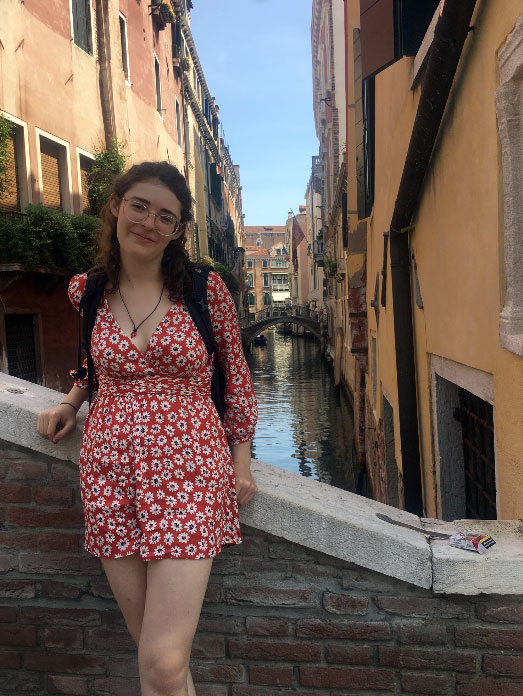 Kaitlin McDermott teaches high school English at Saint Francis Preparatory School [more]
Kaitlin McDermott teaches high school English at Saint Francis Preparatory School [more] Kaitlin McDermott: High School English Teacher
Hi! My name is Kaitlin McDermott, and I am a proud graduate of the QC English program. I was a Macaulay Honors student at Queens and graduated last May with highest departmental honors in English and History.
As a Jeannette K Watson fellow, I interned at various legal organizations during my time at Queens College — including a reproductive health nonprofit and a digital rights NGO. Through these professional experiences, I became increasingly interested in the ways in which effective communication about pressing legal and policy questions often fails; however, the root of this interest in communication stems, in large part, from my experiences within the English Department. As a student, I served as a writing tutor to non-native English speakers with the Queens College Language Lab and at the Queens College Writing Center. Extensive experience teaching in a one-on-one setting was a great introduction for my current work teaching English to high schoolers right here in Queens.
Another project that I was involved in at Queens College was writing for the student blog QC Voices. My blog was focused on exploring issues related to Law & Justice. Again, this opportunity proved impactful. Following graduation, I relocated to Vienna, Austria and began working for an NGO that deals with digital rights. In this position, I was tasked with editing policy proposals and drafting articles on issues related to civil liberties in the Digital Age.
Currently, I am back in New York and have transitioned into a full-time teaching job. In the near future, I hope to use my newly completed TESOL certification to make another move abroad and to continue my teaching journey. I remain grateful for my CUNY education—especially, I am thankful for the time and energy that the QC English Department invested in me and my future.
Connect with Kaitlin on Linked-In.
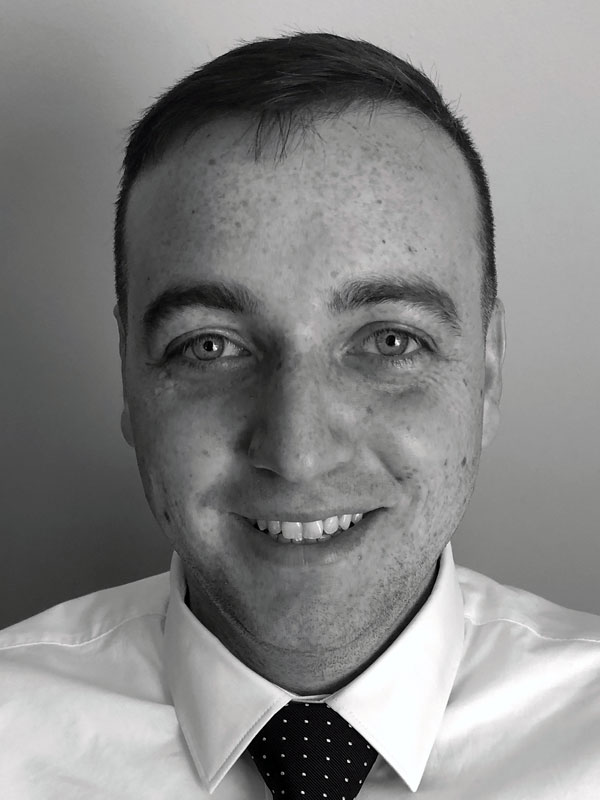 Chris Vitale is an operations & project manager for scientists and tech startups [more]
Chris Vitale is an operations & project manager for scientists and tech startups [more] Chris Vitale: Operations & Project Management
Majoring in English was the smartest decision that I have made to date. I would go even further to say that studying English at Queens College, CUNY, directly prepared me to excel in my career and day-to-day life. Some of that invaluable knowledge includes:
- Translating and being an advocate for multiple perspectives. There is a firehose of opinions, thoughts, and actions happening constantly, so knowing how to capture the key elements of the varied perspectives is something that I learned in the classrooms in Kiely Hall.
- Talking about books that I have never read, or in this case topics that I don’t know much about. All you need to know is enough to talk to other people about that topic. Being humble and opening every step of the way doesn’t help either. You’ve done this in your entire journey at Queens College, don’t be afraid to admit it.
- Avoid adverbs. Need I say more? This one has always stuck with me and helps cut through the noise in a lot of the conversations that I have with my coworkers. (Thank you, Stephen Kruger).
- Take notes. Copious notes. Pro-Tip: Use Google Docs or something similar so they’re easily indexed and searchable at a later date. Make glossaries of jargon and acronyms (there’s far too many). Make to-do lists and log decisions that were made. The same way that you would map out parts of a narrative or build an annotated bibliography, keeping notes helps future you and your entire team more than people are willing to acknowledge.
My career trajectory to date has brought me to organizations large and small. From cutting my teeth in digital products in the early days of Thrillist and mental_floss, to project managing website migrations and a team of undergraduate content creators for Queen’s College and the City University of New York as a part of a unique digital fellowship, through to managing the software development lifecycle and client project management at small digital agency within one of the nation’s largest technical recruiting firms, MondoLabs of Mondo—delivering projects for PayPal, McKesson, IBM, and more— and finally to where I was most recently as the leader of the Project Management Office (PMO) at BeenVerified. In the midst of this I even earned my MALS in Digital Humanities from the CUNY Graduate Center because who needs to sleep?
Today I am leading Operations & Project Management for a venture-backed stealthmode team of incredibly smart research scientists exploring the relationship between diet and disease, while running a few smaller startups taking a crack at services for mission-driven small businesses (www.productpaths.com) and bringing brands in front of video game streamers and their audiences (www.wearehazard.com)
Nothing that I have done in my career was on that list of jobs you get with your major. But everything that I learned directly applies to what I do every single day.
Long story short, for all the paranoid English majors who have read one-too-many memes on Facebook about their imposing doom, it’s going to be okay.
Just hustle. Learn. Adapt. Think critically. Read closely.
Don’t be afraid to bullshit a little. You do it every time you fluff up your papers to hit 10 pages. It’s worth far more than you realize.
Connect with Chris on Linked-In.
 Rob Rosengarten is a corporate attorney who does pro bono work for the LGBTQ community [more]
Rob Rosengarten is a corporate attorney who does pro bono work for the LGBTQ community [more] Rob Rosengarten: Vice President & Assistant General Counsel
English was my least favorite area of study in high school. I was not an especially skilled writer and often felt disconnected from my own written words. My essays were a lot like a protein bar — they satisfied the basic requirements but were bland and uninteresting.
This did not bode well for my future legal career, I thought. What chance of success did I stand in law school and then as a legal professional if my writing was weak? I needed to make a change, so I decided to major in English hoping to restart my relationship with writing. Looking back, I could not be happier with that decision.
My English professors at QC were some of the most thoughtful and creative people I had and have ever met. Under their guidance I gained some of the critical thinking and language skills I needed to prepare for law school at NYU, and I learned a lot about myself and the world around me along the way. I still consider “Reward Notice”, a short story I wrote while at QC about the horrors of groupthink, to be one of my proudest academic accomplishments.
These days my week is dominated by my job as a corporate lawyer. I spend a lot more time drafting and negotiating contracts and a lot less time reading and writing fiction.
Being an attorney has also opened up new and meaningful pro bono opportunities. I’ve had the privilege of working closely with the Environmental Defense Fund to research and analyze clean energy-related legal and policy issues. I’ve also drafted a motion challenging the dubious murder conviction of a teenager and represented a transgender client in connection with their name change petition.
Though it’s been close to a decade since I graduated college, I still carry with me pivotal lessons learned at QC. One I would offer is to not be afraid to recognize your weaknesses. It’s okay to not know everything yet, especially when you’re in school. Embrace it! Once you know what you don’t know, you can build from there.
Connect with Rob on Linked-In.
 Sabina Eck is an English Language Arts teacher [more]
Sabina Eck is an English Language Arts teacher [more] Sabina Eck: English Language Arts Teacher
I graduated from Queens College in 2018 as a English and Secondary Education double major. When I graduated I owed a massive debt to this institution. Not a physical debt, I am endlessly grateful to the access to quality affordable education from Queens College. I owed a debt to the English professors who opened up my worldview. I attended a college approximately 6 miles from my home, but I felt as though I was able to travel the world. All of this, I owe to receiving a quality education in the field of English at Queens College. Literature is liberating, it is an art form that allows us to not only look inward at ourselves and see our own reflection but it is also a means that we get to look outward and see the perspective and history of others. All of this is a tool for radical liberation in the classroom, I know that studying literature was a vehicle to my own autonomy. I was a working class woman, from a small industrial town in Queens. I suffered from imposter syndrome believing that all others knew better than me. I found my voice because of Queens College, and was able to truly feel as though I could take up academic space. But what does it mean when you leave the halls of Queens College and step back into the workforce? We all have to pay bills and sadly, just taking up academic space doesn’t always do that. And what about other students, sitting in a classroom, feeling like their theories and thoughts don’t hold weight?
I have been lucky to work in education for about 5 years now, and currently am employed as a middle school ELA teacher working in Coney Island. I strongly believe I would not be an effective teacher had it not been for the rigorous and rewarding work of the English department in Queens College. Every single day I am a more culturally competent teacher for my own students because I was taught nuanced history and perspectives through the lens of literature. I get to pass on the gift Queens College gave to me. With every new year, people learn more and more about the history of our nation and of colonialism. And every year people say “why weren’t we taught this?”. I get to say that I was, as a Queens College student, and now my 5th grade kids are able to receive that education as well. Intergenerational radical change is possible due to the dissemination of information that reflects my students individual and cultural experiences. This year, a brilliant 5th grader I work with wasn’t showing her full potential. She said she felt like she couldn’t truly do the work, she was scared that she would be seen as stupid for sticking her neck out in class. By the end of the year she was one of the top students in the class, and states that because of the work in ELA she was able to feel more confident and proud in herself. If you are reading this, you are considering this undertaking. Do this for yourself, and for the change you can enact on an individual and holistic level no matter the career you choose. To study English at Queens College allows you to learn best practices in studying historical context, the ability to communicate complicated texts and concepts, and to persuade others in a professional and compelling way. No matter where you go following this field of study, you will be a better person and professional because of it. And along the way you may be able to empower others how you have been empowered and leave this world a little better than you found it.


